Showcase PhD
Interested in a Contribution?
| Are you a PhD student at PhF and have organized an exciting event, participated in an interesting excursion or received an award? We would be happy to publish your contributions here, please contact us by e-mail graduiertenschule@phil.uzh.ch. |
Peer Mentoring Program IPZ
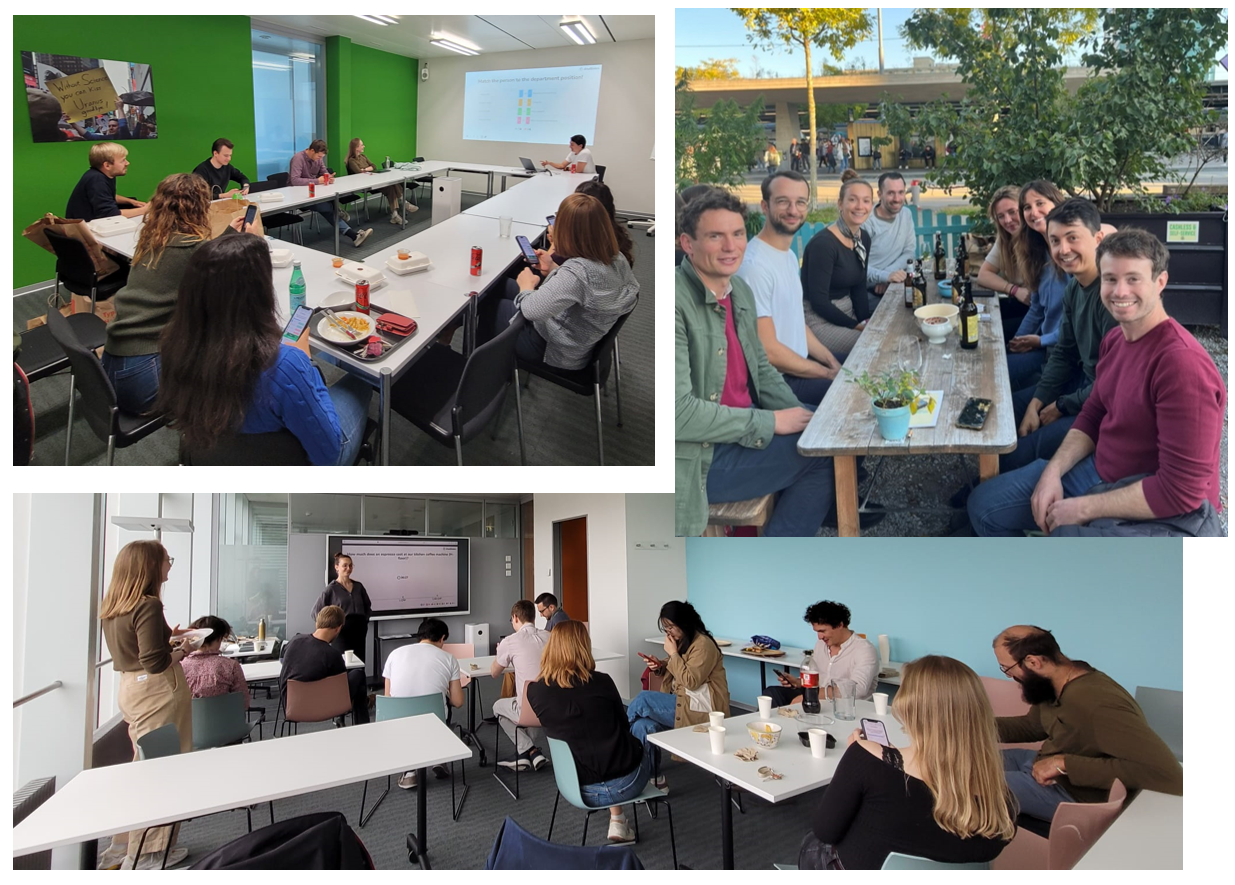
Bericht der Organisator:innen, November 2024.
Diese Peer Mentoring Gruppe wurde von der Graduiertenschule gefördert.
The Peer Mentoring Program at IPZ is an important initiative to support new PhDs and postdocs, foster integration, and strengthen community ties within the department. Launched in 2023, the program matches new members with experienced members who volunteer to serve as mentors. In 2024, the program successfully matched approximately 10 new members with mentors, ensuring personalized support for each mentee. After the initial introduction, mentors and mentees were encouraged to meet for an initial tea/coffee session within two months of the mentee's arrival to help establish early connections and clarify expectations.
At the beginning of the fall semester, we held our first "Welcome (back) Apéro". This event provided an opportunity for new members to meet their peers, while also welcoming returning members after the break. To further support networking, a special networking lunch was organized once a semester for mentors and mentees. Held in a World Café format, the lunch allowed participants to share experiences and insights while engaging in a fun activity, such as a quiz. This format fostered meaningful conversations and helped build a sense of community within the group. At the end of each semester, all mentors and mentees were asked to complete a short survey to evaluate the program and provide feedback for future improvements.
Overall, the peer mentoring program successfully contributed to the academic and social integration of new members of the department. By providing structured mentorship and fostering an inclusive environment, the program promoted both professional development and a sense of belonging for all participants.
Junge Zürcher Mediävistik (JZM)
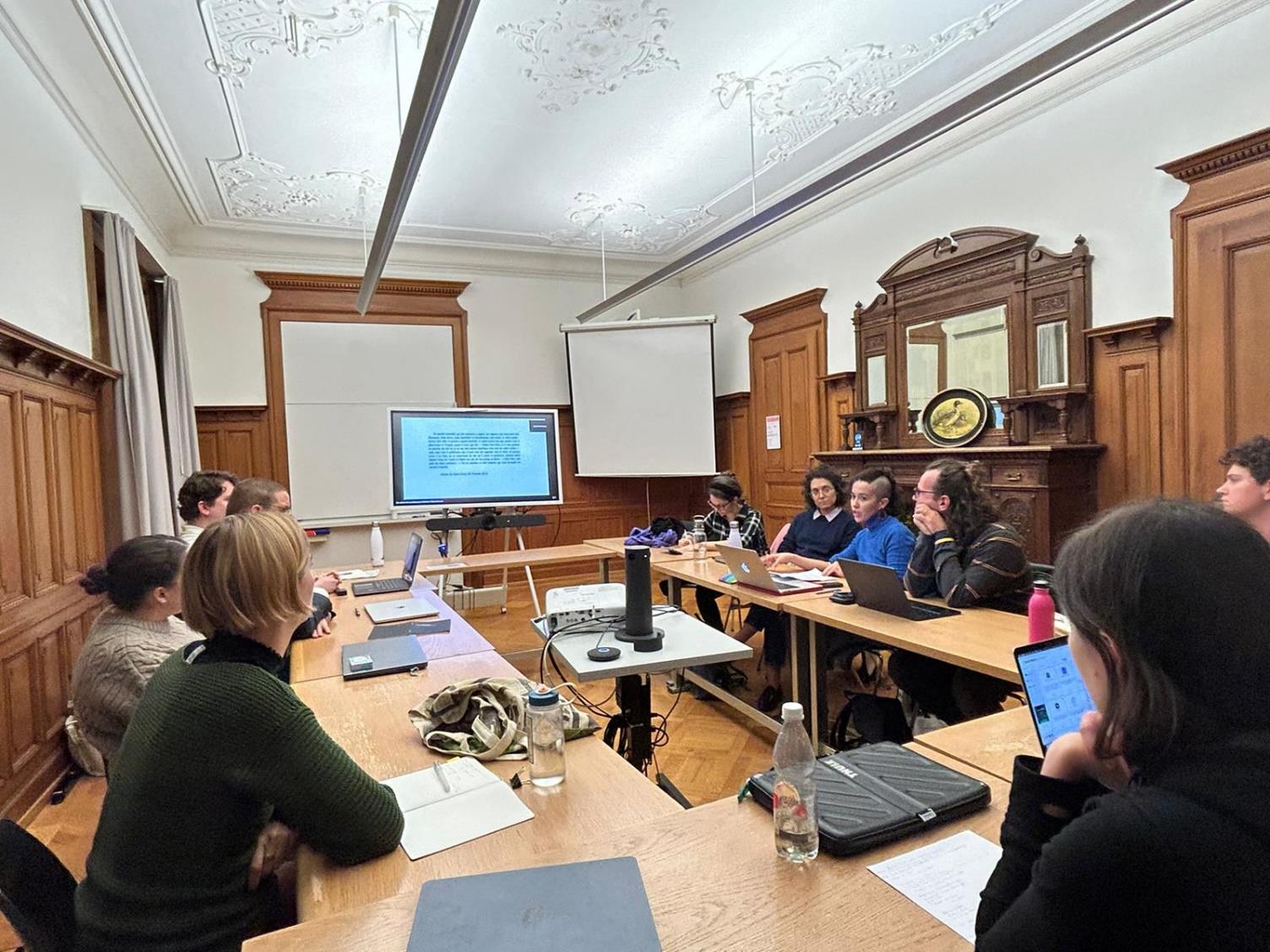
Bericht von Luca Hollenborg, November 2024.
Diese Peer Mentoring Gruppe wurde unterstützt von der Graduiertenschule.
Im Herbstsemester 2024 organisierte die Junge Zürcher Mediävistik (JZM) mit großzügiger Unterstützung der Graduiertenschule zwei Mittelbaukolloquien. Seit nunmehr über 25 Jahren bringt die JZM Nachwuchswissenschaftler:innen aus den unterschiedlichsten mediävistischen Disziplinen aus Zürich und von anderen Universitäten im In- und Ausland zusammen, um einen interdisziplinären Austausch zu fördern.
Das erste Mittelbaukolloquium des Semesters fand am 24. Oktober statt und bot spannende Einblicke in die Vielseitigkeit mediävistischer Forschungsthemen. Daria Aeberhard von der Zürcher Germanistik stellte in ihrem Vortrag althochdeutsche Flurnamen vor und veranschaulichte, wie diese sprachlichen Relikte in Grenzbeschreibungen zu finden sind. Emma Belkacemi-Molinier von der Romanistik der Sorbonne Université sprach in ihrem Vortrag über die Rezeption der Bibel in Gralsromanen.
Dank der finanziellen Unterstützung der Graduiertenschule ist es uns möglich, auch auswärtige Gäste, wie in diesem Fall aus Paris, zu uns nach Zürich einzuladen. So findet nicht nur ein interdisziplinärer, sondern auch ein internationaler Austausch statt. Dadurch etabliert sich die Universität Zürich als wichtige Anlaufstelle der Mediävistik. Ein anschließendes Apéro bietet weiteren Raum für fachlichen Austausch und persönliche Vernetzung.
Anlässlich des 25-jährigen Jubiläums der JZM wird zudem eine Exkursion zur historischen Brunngasse organisiert, einem zentralen Schauplatz jüdischen Lebens im mittelalterlichen Zürich. Diese Exkursion bietet den Teilnehmenden die Möglichkeit, das mittelalterliche Erbe der Stadt und die oft vergessene Geschichte der jüdischen Gemeinde in Zürich hautnah zu erleben. Solche Erkundungen machen deutlich, wie stark das Mittelalter als Epoche mit unserer Gegenwart verwoben ist und wie dessen historische Spuren bis heute nachwirken.
Zum Abschluss des Herbstsemesters findet am 28. November ein weiteres Kolloquium mit Vorträgen aus der Zürcher Mediävistik statt. Fabienne Ziegler aus der Germanistik untersucht Begrifflichkeiten aus dem Wortfeld der Sünde in der Übersetzung der gotischen Bibel. Dr. Johannes Luther aus der Geschichte präsentiert Quellen für eine geschichtswissenschaftliche Auseinandersetzung mit weiblichem Gesang im 13. Jahrhundert.
Die vielfältigen Aktivitäten der JZM unterstreichen die Bedeutung eines interdisziplinären Austauschs in der wissenschaftlichen Auseinandersetzung mit dem Mittelalter. Als zentraler Knotenpunkt für Nachwuchswissenschaftler:innen leistet die JZM einen wichtigen Beitrag zur Vernetzung und zum fächerübergreifenden Dialog - eine Aufgabe, die hoffentlich auch in den kommenden Jahren fortgeführt und weiter ausgebaut wird.
Forschungsaufenthalt in Grossbritannien
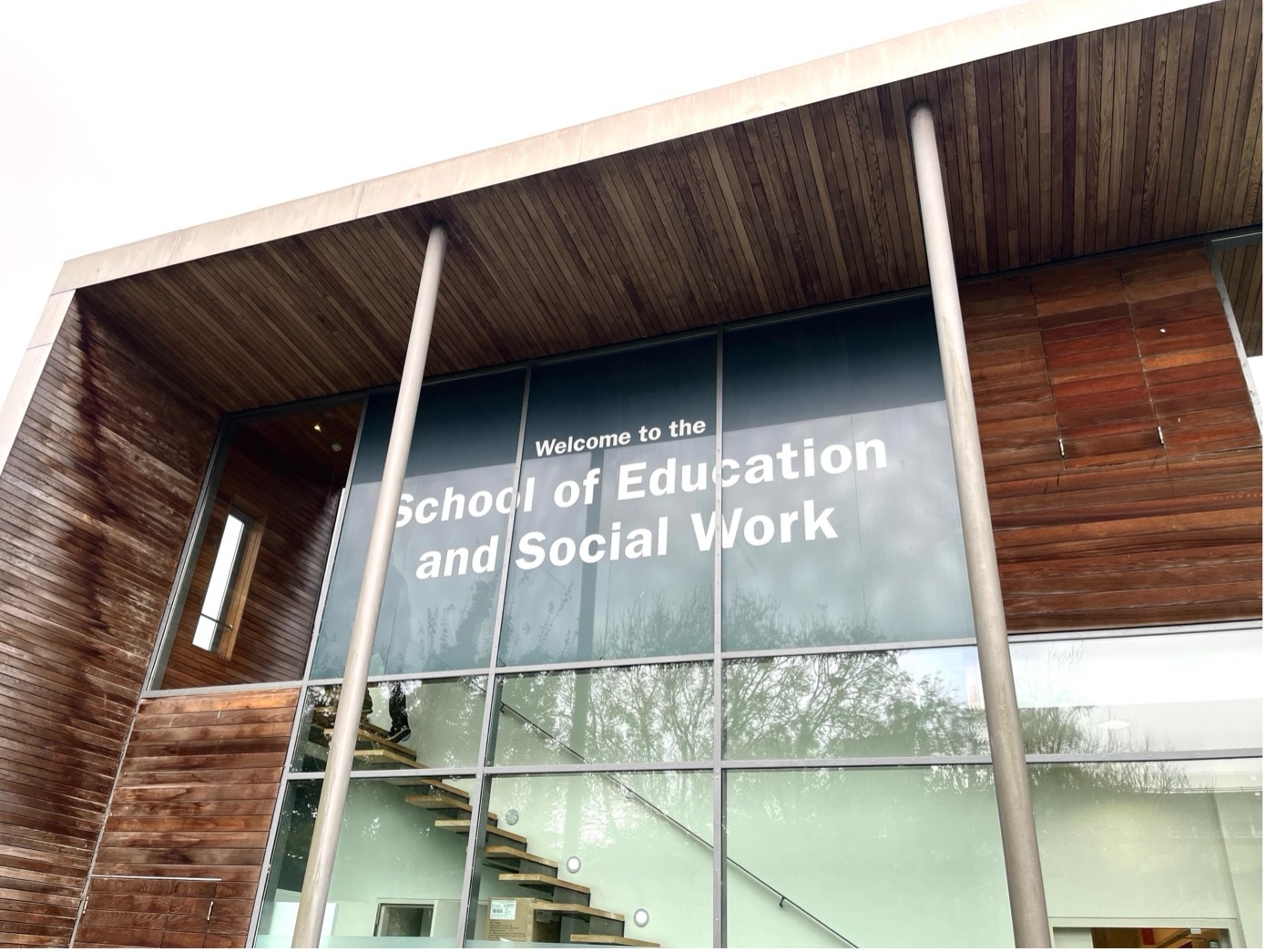
Bericht von Luiza Vafina, November 2024.
Dieser Forschungsaufenthalt wurde durch die Graduiertenschule gefördert.
In meiner Dissertation untersuche ich kindliche Perspektiven auf ihre Geschwisterbeziehungen. Da insbesondere in der britischen Soziologie bereits einige Forschungsarbeiten in diesem Bereich durchgeführt wurden, entschied ich mich für einen Forschungsaufenthalt in Grossbritannien. Dank der Unterstützung der Graduiertenschule konnte dieser Wunsch in Erfüllung gehen – im Herbst 2024 durfte ich drei Wochen in Grossbritannien verbringen.
Mein akademischer Aufenthalt fand im Zentrum für Innovation und Forschung in Kindheit und Jugend an der Universität Sussex statt. Dort hatte ich die Gelegenheit, den Stand meines ersten Artikels zur Geschwistergewalt intensiv mit anderen Forschenden zu diskutieren und wertvolle Anregungen mitzunehmen. Ausserdem ermöglichte mir der Aufenthalt den persönlichen Austausch mit meiner Zweitbetreuerin, die an der Universität Southampton tätig ist.
Darüber hinaus konnte ich mich während meines Aufenthalts persönlich mit weiteren Forscherinnen von verschiedenen Universitäten – der Universität Oxford, Universität Sheffield und Universität Stirling – über mein Dissertationsthema austauschen. Abschliessend habe ich gemeinsam mit einer Professorin der Universität Sussex eine Lehrveranstaltung für Bachelorstudierende gestaltet, was meine Lehrerfahrung weiter bereichert hat.
Dieser Aufenthalt hat meinen Dissertationsprozess wesentlich vorangebracht. Ich bedanke mich herzlich bei der Graduiertenschule sowie bei meiner Professorin, Prof. Dr. Catrin Heite, für diese einzigartige Möglichkeit.
Pre-Publication Seminar at the Department of Political Science, Fall Semester 2024
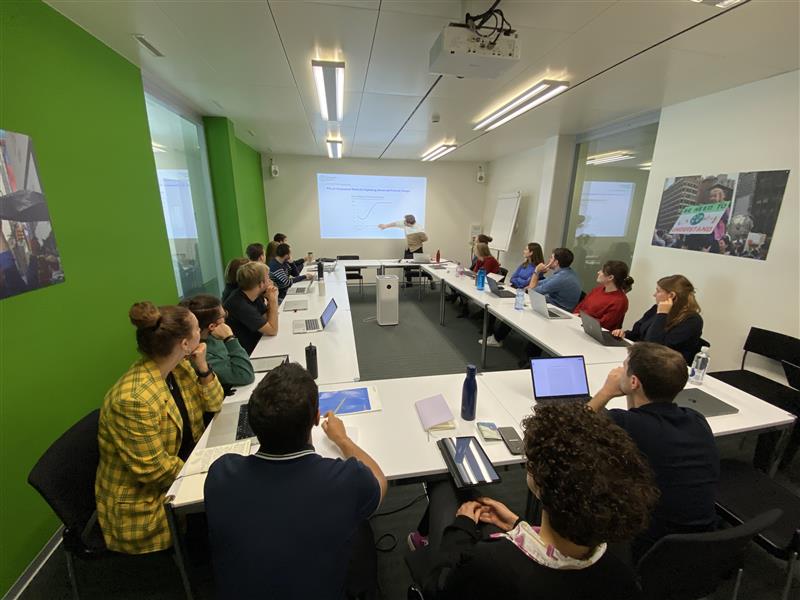
Report by the organizers, November 2024.
This Peer Mentoring Group was supported by the Graduate School.
The Pre-Publication Seminar at the Department of Political Science is a key peer-mentoring program for doctoral and postdoctoral researchers, providing a supportive environment for presenting work in progress and receiving constructive peer feedback. This seminar not only helps presenters refine their projects but also fosters essential critique skills among participants. In the Fall Semester 2024, we organized eight sessions, each attended by 15–20 participants, underscoring the seminar’s ongoing relevance and value within the department.
Each session followed a structured format: a researcher delivered a 15-minute summary of their paper, pre-analysis plan, or synopsis, which had been shared with participants in advance. Two selected discussants—one PhD candidate and one Postdoc—offered critical feedback, identifying strengths and areas for improvement. The presentation was followed by an open-floor Q&A, allowing all attendees to contribute additional feedback.
Sessions concluded with informal coffee gatherings, encouraging networking and community-building among early-career researchers. Participants reported that the seminar significantly enhanced both their research quality and academic skills. The seminar’s interactive format fosters a supportive academic community, strengthening early-career researchers’ integration into the department.
Overall, the Pre-Publication Seminar remains a vital peer-mentoring platform in the Department of Political Science, contributing substantially to participants’ personal and professional growth. Its regular sessions and constructive feedback process reinforce its role as a cornerstone of peer-led mentorship within the department.
Archivaufenthalt in London
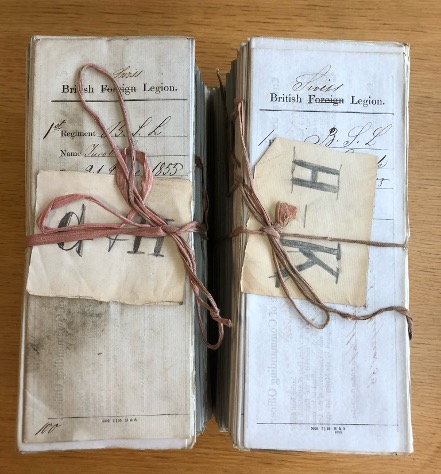
Bericht von Valeria Vollmer, November 2024.
Dieser Forschungsaufenthalt wurde von der Graduiertenschule gefördert.
Im Fokus meines Dissertationsprojekts steht die Analyse von Söldnermemoiren, die im Kontext des Krimkriegs (1853-1856) entstanden sind. Das Projekt soll untersuchen, wie Mitglieder der Zuavenregimenter, der Legiony Polskie, der British-German-Legion, der British-Swiss-Legion und der Seconde Légion Étrangère in Selbstzeugnissen ihren Einsatz in einer Fremdenlegion in den 1850er- Jahren rückblickend darstellen. Ziel des Projektes ist es eine Kollektivbiografie zu verfassen.
Für meine Forschungsarbeit vergleiche ich unter anderem unveröffentlichte Selbstzeugnisse aus Schweizer Archiven mit Quellenbeständen aus britischen, französischen und polnischen Archiven. Dank der Förderung der Graduiertenschule war es mir möglich im September 2024 einen zentralen Bestandteil meines Quellenkorpus, Primärquellen in der British Library und den National Archives, in London zu sichten. Es ist für mich ein Privileg, dass ich während eines Monats Briefe, Tagebücher, Verwaltungsdokumente, Söldnerregister, Karten und Fotografien, die der British-German-Legion, der British-Swiss-Legion und der Legiony Polskie zugeordnet werden können, in den Archiven studieren durfte. Während meiner Recherchereise konnte ich zudem Londoner Monumente aufsuchen, die an Akteur:innen des Krimkriegs erinnern. So besichtigte ich beispielsweise das Guards Crimean War Memorial am Waterloo Place, die Mary-Seacole - und Florence-Nightingale-Statuen in Central London und die Crimean War Cavalry und Coldstream Guards Inkerman Memorials in der St Paul’s Cathedral. Ebenso konnte ich in der Sammlung des Maritime Museum in Greenwich Exponate, die die Geschichte des Krimkriegs im Baltischen Meer dokumentieren, ausmachen. Zugleich hatte ich während meines Archivaufenthalts Gelegenheit am Kolloquium des Deutsch Historischen Instituts London teilzunehmen und Fachliteratur in der institutseigenen Bibliothek am Bloomsbury Square zu konsultieren. Der Zugang zu den Dokumenten aus den britischen Archiven bildet die Grundlage für die weiterführenden Analysen in meinem Dissertationsprojekt. Ich bedanke mich bei der Graduiertenschule der Philosophischen Fakultät für die Unterstützung bei diesem Vorhaben.
Report Peer Mentoring Group IPZ
Report by the organizers, November 2024.
This Peer Mentoring Group was supported by the Graduate School.
From October 18-20, 2024, a group of 15 Postdocs and PhD students from the IPZ gathered in the serene village of Castasegna for a focused workshop to read and comment on each other’s work. Nestled in a quiet, natural setting, the retreat provided us with the ideal environment to disconnect from daily distractions and fully engage in our research.
The retreat included sharp 30 minute sessions, where participants would first present their work (10 minutes) before receiving feedback from two pre-agreed discussants (5 minutes each). Over the course of the workshop, each participant had one presentation and two papers to discuss. Conversations about our work and experiences as early-stage scholars continued over lunch and dinner provided at Villa Garbald, renowned for its history of hosting intellectual events.
One of the most valuable aspects of this retreat was the sense of community and mutual support. Research can be isolating, but the camaraderie we built in Castasegna reminded us of the importance of collaboration and solidarity in academia. Sharing insights into each other's research offered fresh perspectives, and we learned new techniques for tackling complex research questions and managing large projects more effectively.
We left Castasegna with significant progress on our individual projects, a renewed commitment to our academic journeys, and – most importantly - a strong support network. As many participants had just begun their PhDs, this was also a fantastic way to integrate quickly and forge relationships in the IPZ
Datensitzungen mit den Professoren Matthias Herrle und Arnulf Deppermann
Bericht von Lee Ann Müller, November 2024.
Diese Selbstorganisierte Arbeitsgruppe wurde unterstützt von der Graduiertenschule.
Am 26. und 27. September fanden im Rahmen der selbstorganisierten Arbeitsgruppe «Videografie in schulischen Peer-Interaktionen» Datensitzungen mit Jun.-Prof. Dr. Matthias Herrle von der Universität Wuppertal statt. Der ausgewiesene Experte in mikroethnografischer Interaktionsforschung gab zu Beginn einen kurzen Einblick in die methodischen Schwerpunkte seiner Arbeit. Anschliessend wurden die ersten zwei Dissertationsprojekte vorgestellt und jeweils anhand eines Datenbeispiels diskutiert. Lee Ann Müller interessiert sich in ihrem Projekt für «Dimensionen von Partizipation im Klassenrat» und legte den Fokus in der Beispielsequenz auf multimodale Aspekte von Partizipation. Jonathan Tadres präsentierte Daten von Schreibkonferenzen aus der Primarstufe, in denen Schüler:innen eigene Texte gemeinsam Satz für Satz überarbeiten und thematisierte dabei ebenfalls partizipative Aushandlungsprozesse.
Der erste Teil des Workshops wurde am Donnerstagabend mit einem feinen Essen im Restaurant «Schipfe» am Limmatufer abgerundet.
Am Freitagmorgen stellten Simona Geissbühler und Claudine Giroud ihre Daten zu Peer-Interaktionen im Deutsch- und Mathematikunterricht vor. Mit einem Fokus auf den Deutschunterricht und dem Handeln von schulischen Heilpädagog:innen und Kindern mit Förderbedarf präsentierte Claudine Giroud eine Sequenz aus der zweiten Klasse, in der zwei Schüler:innen gegenseitig ihre Texte anhand einer Checkliste überarbeiten. Simona Geissbühler, die in ihrem Projekt Dissens in fachlichen Aushandlungsprozesse fokussiert, brachte eine Beispielsequenz aus einer Übergangsphase im Mathematikunterricht mit, in der zwei Schüler:innen über die Richtigkeit Malaufgabe diskutieren. Herr Herrle konnte durch seine Expertise wichtige Forschungsimpulse mitgeben und regte einen spannenden Austausch über die Dissertationsprojekte hinweg an, von dem wir zukünftig sicher profitieren können.
Am 21. und 22. Oktober durften wir einen knappen Monat später mit Prof. Dr. Arnulf Deppermann einen zweiten Experten (diesmal auf dem Gebiet der Gesprächsanalyse) begrüssen, der an zwei Halbtagen unsere Daten mitanschaute und uns mit fachlichen Inputs in der Weiterentwicklung unserer Forschungsprojekte unterstützte. Anhand von Lee Ann Müllers und Jonathan Tadres’ Daten wurden argumentative Strategien wie beispielsweise Modalisierungen von Schüler:innen in der Rekonstruktion von Ereignissen im Klassenrat oder bei der Kritikausübung in Schreibkonferenzen diskutiert. Mit Claudine Girouds und Simona Geissbühlers Daten aus dem Deutsch- und Mathematikunterricht wurde u.a. die Frage fokussiert, ob und inwiefern sich soziale und fachliche Aspekte in beispielsweise Dissensaushandlungen in Peer-Interaktionen unterscheiden lassen. Herr Deppermann konnte uns nicht nur für wichtige Aspekte bei der Datenanalyse sensibilisieren, sondern gab uns auch entsprechende Anregungen für unsere mehrjährigen Projekte mit auf den Weg.
Ein grosses Dankeschön an die Graduiertenschule für die tolle Möglichkeit, mit ausgewiesenen Experten aus dem Bereich der (Peer-)Interaktionsforschung in den Austausch zu treten. Merci!
Forschungsaufenthalt H.C. Andersen Center, Süddänische Universität Odense
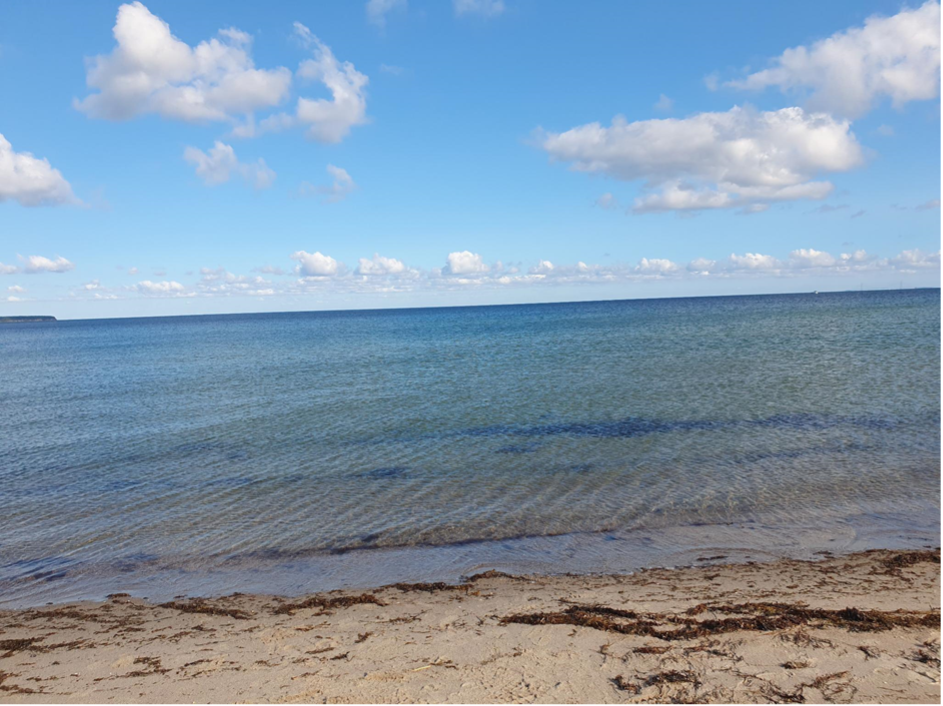
Bericht von Alexia Panagiotidis, Oktober 2024.
Dieser Forschungsaufenthalt wurde von der Graduiertenschule gefördert.
In meiner Dissertation schreibe ich über antike Mythen in den Märchen des Dänen H.C. Andersen. Es ist eine Seltenheit, dass es für einen einzelnen Autor ein eigenes Forschungsinstitut gibt - und eine einmalige Gelegenheit, sich gezielt mit Forschenden auszutauschen. Während meines Aufenthaltes in Odense konnte ich von laufenden Projekten profitieren. Die digitale Manuskriptausgabe von Andersens Märchen ist nicht nur für meine Dissertation relevant, sondern auch wegweisend für zukünftige Forschungsprojekte. Ich habe miterlebt, wie die neue Website mit den Märchen in Originalausgabe aufgeschaltet wurde und mit hausgemachtem dänischem Kuchen mitgefeiert. Weiterhin wurde mir ermöglicht, während der Retraite des Centers ein Kapitel aus meiner Dissertation einer internationalen Gruppe vorzustellen, nachhaltiges Feedback zu erhalten und wertvolle Kontakte zu knüpfen. Natürlich in einem Hotel am wilden Meer von Fyn, fernab des Stadtbummels und mit dänischen Fischspezialitäten zu Abend. Da mein Zweitbetreuer am Center ist und mein Projekt tatkräftigt unterstützt, habe ich auch einen Vortrag in seinem Seminar zu Sirenen in „Die kleine Meerfrau“ (1838) vorgestellt und neben den theoretischen Frameworks meines Projekts auch die pädagogisch-didaktischen Aspekte erproben können. Die angeregte Diskussion der Studierenden war alle Mühe wert. Zuletzt ist Kopenhagen nur ein Katzensprung von Odense entfernt und so hat es mich für den Austausch in der Literaturwissenschaft auch dorthin verschlagen.
Language Attitudes Fieldwork in South Africa
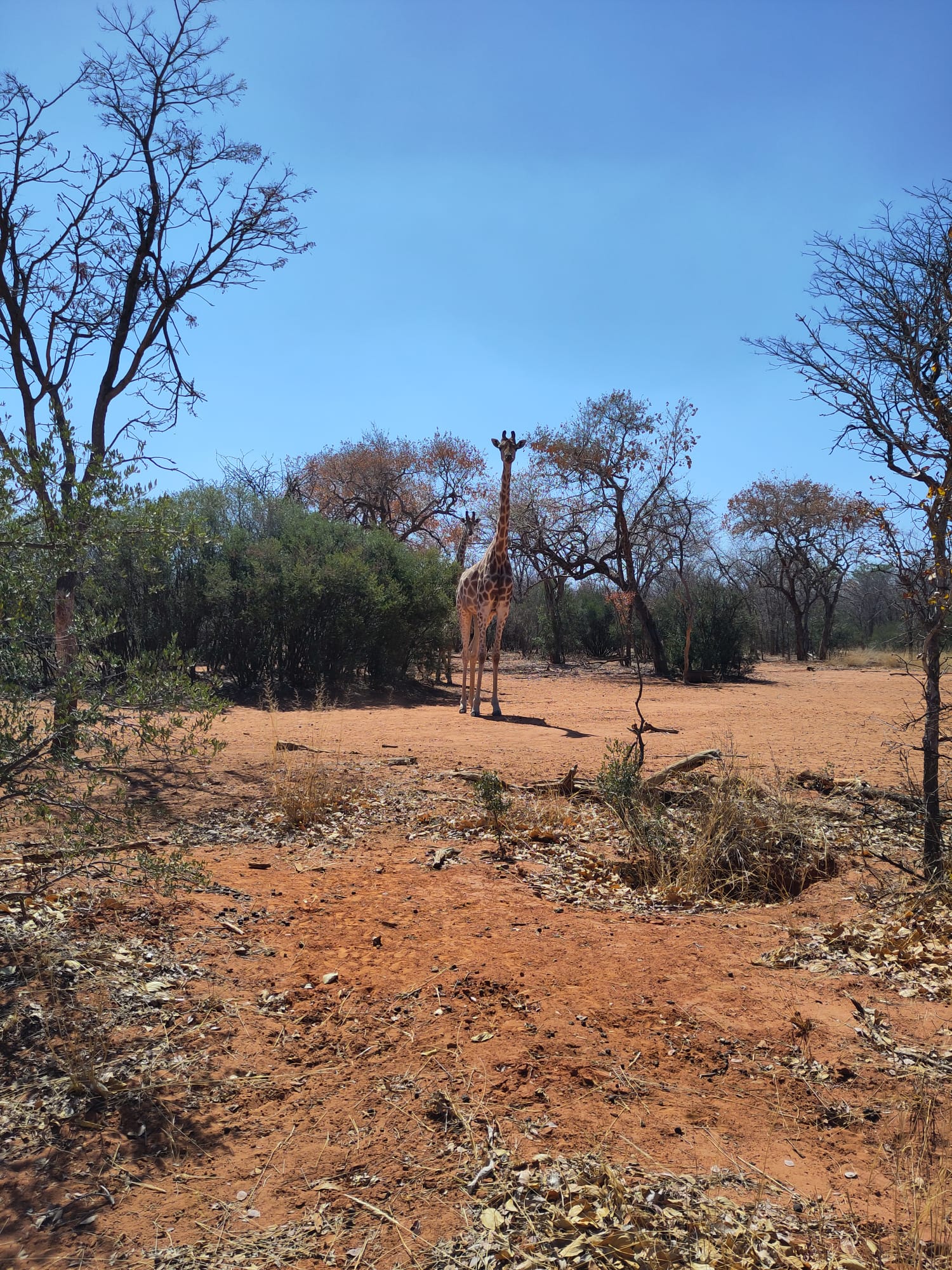
Report by Rebekka Haerter, October 2024.
This Research Stay was supported by the Graduate School.
In October 2024, I had the privilege to spend time in Johannesburg, South Africa, to conduct fieldwork for my PhD dissertation in the field of English sociolinguistics on language attitudes and identity negotiation of first language English and/or Afrikaans speakers in South Africa.
This was the second round of ethnographic interviews that I was able to do, collecting invaluable and highly insightful data for my project. I am interested in investigating how first language English and/or Afrikaans speakers negotiate their (ethno-)linguistic identity in post-apartheid South Africa and what role language(s) and (ethnolinguistic) group identity play in that negotiation. In my first round of interviews, I predominantly collected data from interviewees that self-identify as belonging to the white population group. This time, I had the chance to talk to people that self-identify as non-white or belonging to the coloured population group. Their insights and opinions on, as well as experiences of language(s) in South Africa give me a more nuanced picture of identity construction, negotiation and maintenance in post-apartheid South Africa. My data shows that because of the horrific social engineering, segregation and subjugation of various population groups during apartheid, South Africans still exhibit strong ties to ethnolinguistic group identities, which shows that the language or language variety one speaks is still a clear marker of identity in South Africa today.
As part of this stay, I was given the opportunity to engage with various speakers and communities, travel in and around the greater Johannesburg area, and I even got the chance to take a short trip to a game farm in Rustenburg, seeing African wildlife up close.
Writing Retreat of the Doctoral Students in Islamic and Indian Studies
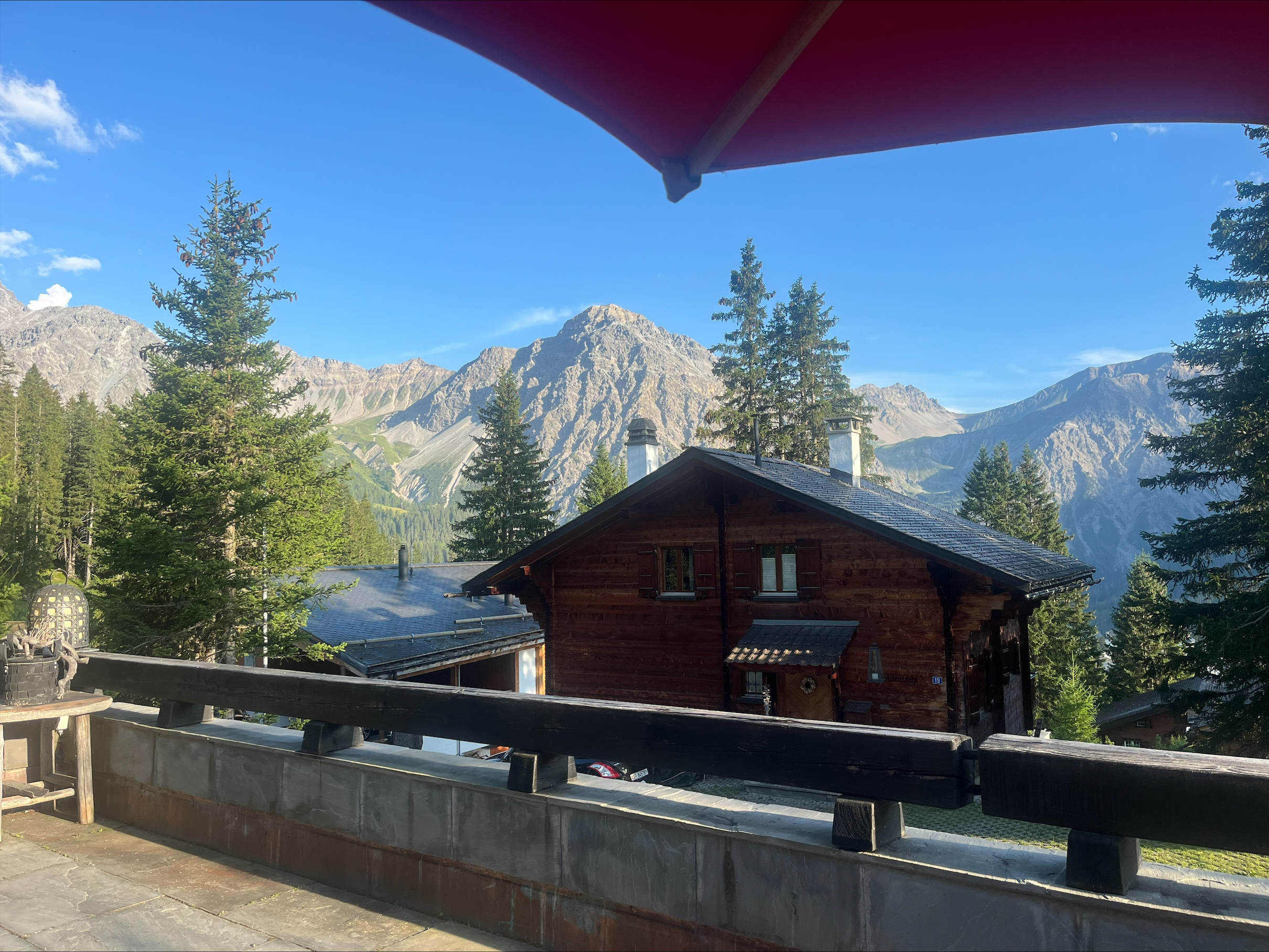
Report by Moubani Maitra, Sina Ritt, Genevieve England, and Dominik Folger, August 2024.
This Writing Retreat was supported by the Graduate School.
From August 12 to 15, 2024, we, PhD students participated in a writing retreat aimed at enhancing our academic writing skills in a supportive environment. Guided by Marie Duchêne, an experienced editor and producer, we gained valuable insights into effective writing strategies.
The retreat began with a feedback session, where we discussed pre-submitted texts. This session helped create a supportive atmosphere, encouraging us to approach the writing process with less apprehension and fostering a culture of learning from mistakes.
The second day was dedicated to focused writing on our individual projects, followed by an afternoon session where Ms. Duchêne provided practical advice on text development and avoiding common pitfalls. Her insights offered new perspectives and techniques to improve our work.
The third day centered on peer-to-peer exchange. After a morning of concentrated writing, we spent the afternoon discussing the challenges young researchers face in academic writing, learning from each other's experiences and addressing common difficulties collaboratively.
The retreat concluded with a reflection session, where we reviewed our progress and solidified the insights gained. This final discussion allowed us to appreciate our accomplishments and acknowledge the challenges we had overcome.
Our retreat not only provided a space for focused writing but also fostered a supportive community enriched by peer exchange and expert guidance. This experience was a unique opportunity to shape our writing processes collaboratively within an informal, productive framework.
GTM-Konkret

Bericht von Johanna Egli, Juni 2024.
Diese Selbstorganisierte Arbeitsgruppe wurde unterstützt von der Graduiertenschule.
Eine PhD-Werkstatt zur Bewältigung von Herausforderungen und Unsicherheiten in der praktischen Arbeit mit der Grounded Theory Methodologie (GTM).
Viele Doktorierende fühlen sich in der konkreten Anwendung der Grounded Theory Methodologie in ihrem eigenen Dissertationsprojekt mit Herausforderungen und Unsicherheiten konfrontiert. Wie kann das eigene Dissertationsprojekt entlang projektspezifischer Anforderungen mit der GTM hervorgebracht werden? In dieser Werkstatt haben wir uns daher intensiv mit den projektspezifischen Herausforderungen und Unsicherheiten in der Umsetzung der GTM im unterschiedlichen Dissertationsprojekten auseinandergesetzt.
Dabei standen die Projekte von fünf Doktorierenden im Zentrum. In Slots von je 75 Minuten haben sie ihre aktuellen und/oder beständigen Herausforderungen und Unsicherheiten in der Anwendung der GTM erläutert. Daraufhin wurden in der Gruppe konkrete Lösungsansätze diskutiert und entwickelt. Dabei wurden wir von zwei erfahrenen Kolleg*innen, Dr. Katharina Leimbach (Universität Bielefeld) und Prof. Dr. Peter Rieker (Universität Zürich) unterstützt. Ebenfalls haben interessierte Kolleg*innen an der Werkstatt teilgenommen und die Diskussion bereichert. Neben den Projektslots haben wir uns in drei Slots à 30 Minuten mit allgemeinen Fragen rund um die GTM auseinandergesetzt wie etwa mit dem Grundverständnis zentraler GTM-Begriffe, Herausforderungen bei der Analyse oder der Darstellung methodischen Vorgehens.
Abgerundet wurde die Werkstatt mit einem informellen Austausch bei einem Abendessen nach dem ersten Werkstatt-Tag und einem Mittagessen am zweiten Werkstatt-Tag.
Die Werkstatt wurde allseits als bereichernde Erfahrung und grosse Unterstützung in der Weiterarbeit am eigenen Dissertationsprojekt empfunden. Ein herzliches Dankeschön an die Graduiertenschule für die grossartige Möglichkeit!
Writing Retreat of the Doctoral Students in Political Science
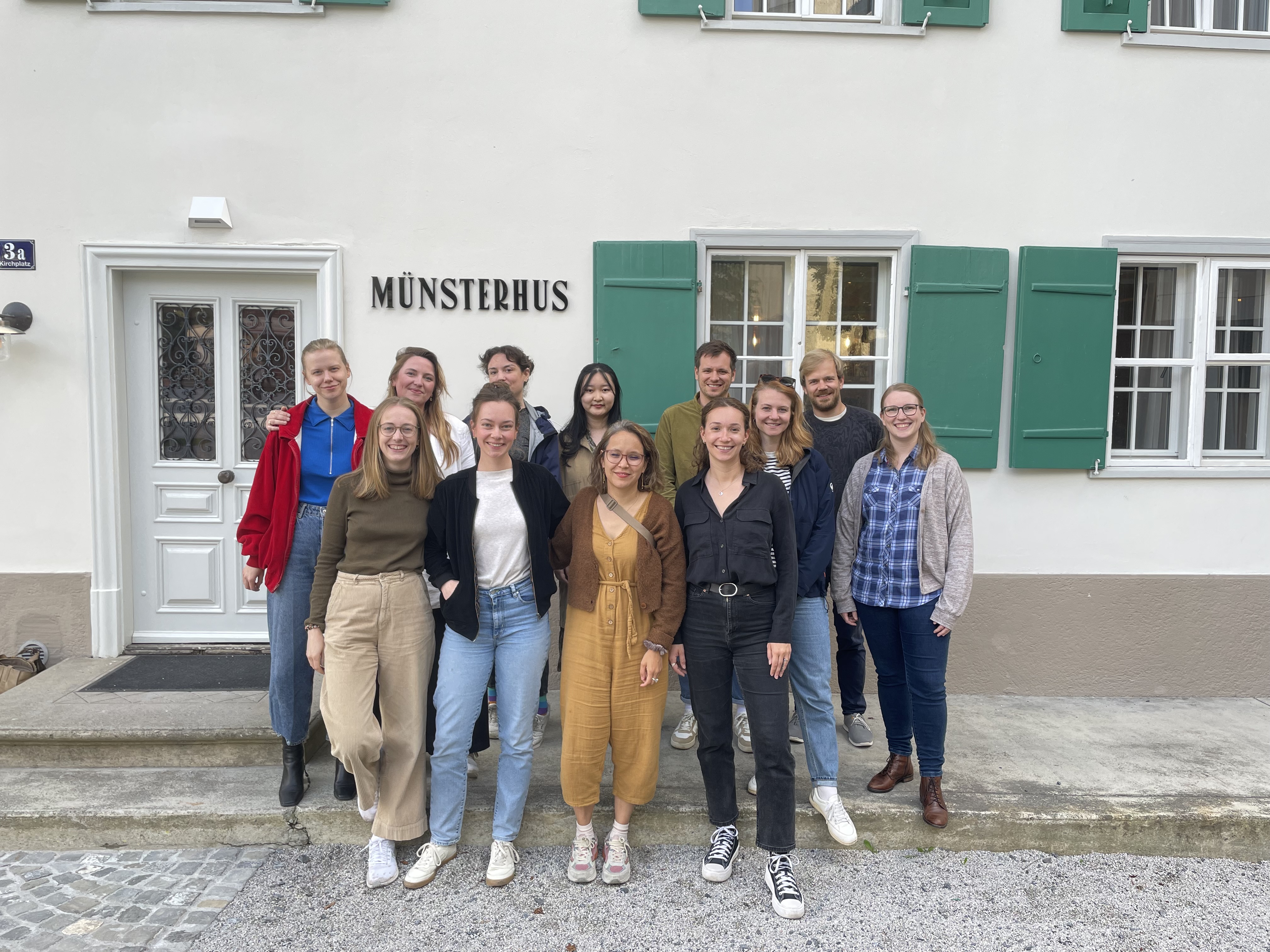
Report by the organizers: Valeria Vuk, Cheryl Vaterlaus and Verena Reidinger, June 2024.
This Writing Retreat was supported by the Graduate School.
From 3. to 6. June 2024, we organized a Writing Retreat in Schruns, Vorarlberg, Austria. We rented a vacation house (the so-called Münsterhaus) for our 13 participants. Over the course of four days, we had multiple intense writing sessions each day. For these writing sessions we provided the participants with a separate room that would create a quiet environment where they could completely focus on their writing. In the morning of every day the participants had some time to set goals for their writing sessions. Using the SMART goal setting strategy the participants reported their daily goals to their accountability buddy (SMART: Specific, Measurable, Achievable, Relevant and Time-Limited). Every participant was assigned another participant as (accountability) buddy with whom they not only set daily goals but also checked whether these goals were met. Additionally, we organized two workshops on writing. Kelly Clancy held a workshop on “Getting Writing Done: Moving from Ideas to Drafts to Submit.” Emma Hoes introduced us to “Writing compelling introductions and structuring your articles.” We used the evenings for activities, such as board games, short hikes, or a special dinner in the mountains with a great view. These activities were a wonderful opportunity for the participants, among whom many were new PhD students of our department, to get to know each other better and build a community.
Peer Mentoring Gruppe Li*Li-Karrierenetzwerk
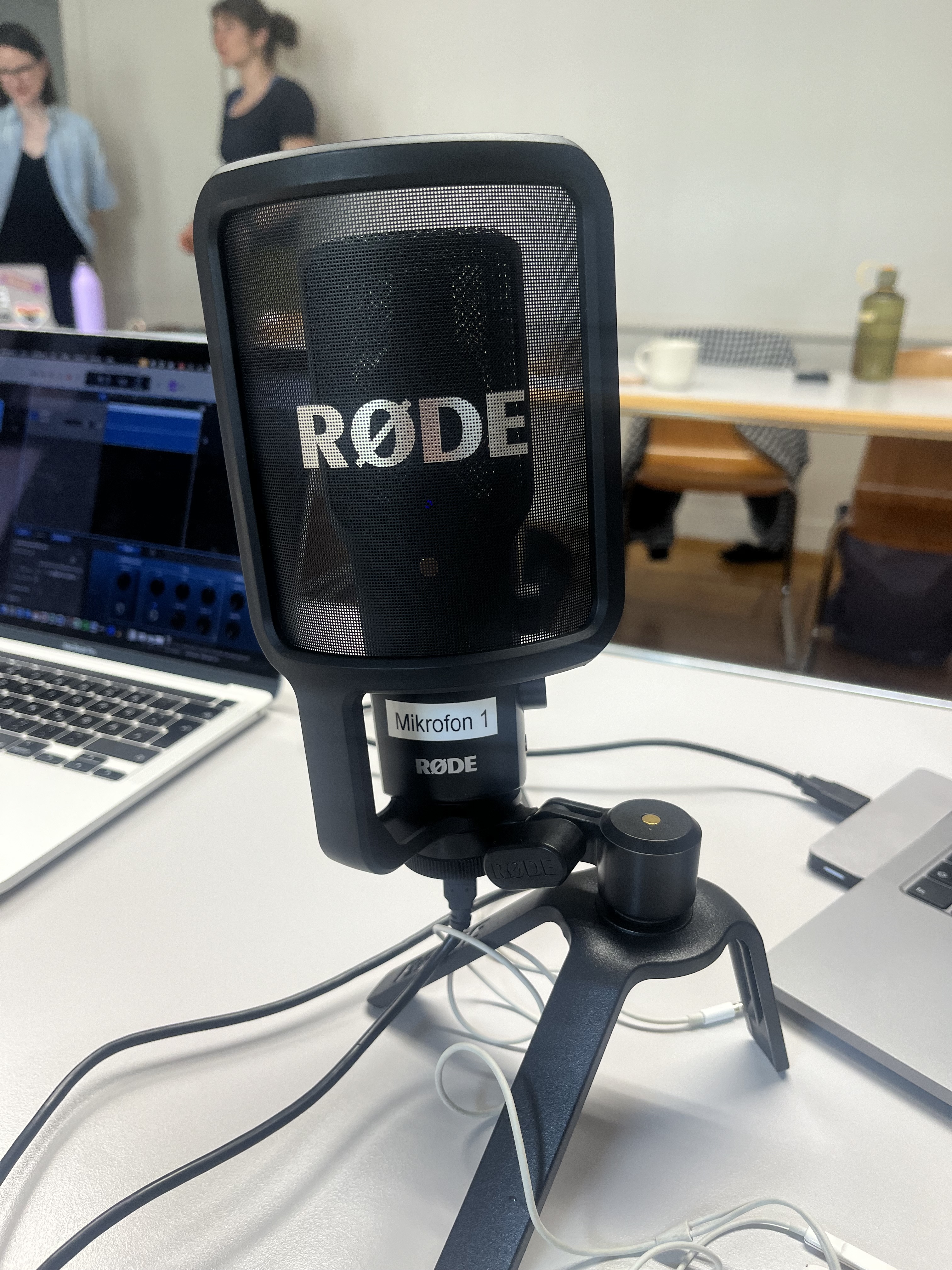
Bericht von Daniela Fuhrmann, Juni 2024.
Diese Peer Mentoring Gruppe wurde unterstützt von der Graduiertenschule.
Die neuen Medien stellen uns Wissenschaftler:innen vor neue Herausforderungen, bieten uns aber auch – abseits von Print und Tagungsvortrag – neue Räume, unsere Wissenschaft zu kommunizieren: Expert:innen-Interviews, eigene Podcasts, Audios anstelle von E-Mails innerhalb der Lehre… Um uns für derartige Wissensvermittlung via Audio zu rüsten, hatten wir am 27. Mai Nadia Zollinger vom SRF zu Gast. Gemeinsam mit ihr erkundeten wir theoretisch wie praktisch die Potenziale von Audio für unseren Wissenschaftsalltag.
An verschiedenen Beispielen konnten wir die Multimodalität von Audio erfahren und darüber nachdenken, wie das Kreieren von Höreindrücken, das Schaffen einer Soundkulisse oder das Spiel mit akustischen Reizen in die Dramaturgie eines gesprochenen Textes einzubeziehen ist, um die Aufmerksamkeit der Hörenden zu gewinnen und zu halten. Schlüsselgeräusche sowie das Herstellen von Spannung durch Differenzeffekte spielen dabei eine besondere Rolle.
Ergänzt wurden die allgemeinen Überlegungen zum Potenzial von Audio und dem dramaturgischen Aufbau hörbarer Inhalte durch einen Input von Salomé Meier, die sich gezielt der Gestaltung und dem Sprechen von Manuskripten widmete. „Schreiben fürs Hören“ erfordert – ganz entgegen unserer wissenschaftlichen déformation professionelle – kürzere Sätze, wenige Fremdwörter, die lebendige Modulation und den Mut, Fehler zuzulassen. Kleine Versprecher oder spontanes Lachen schaffen eine größere Nähe zum Publikum.
Einen wesentlichen Teil des Workshops nahm das spielerische Ausprobieren der Technik ein: Wir lernten gute Aufnahme-Apps kennen (z. B. „Rode Reporter“), testeten verschiedene Mikrofone und stellten dabei fest, wie viel weniger natürlich wir sprechen, sobald ein schwarzes Ding mit Spuckschutz vor uns steht. Welch ein Glück, dass es auch kleine Ansteckmikrofone gibt, die über die Aufnahmesituation hinwegtäuschen. Mit dem Programm „Garageband“ lassen sich alle Aufzeichnungen selbst von Amateur:innen leicht bearbeiten und zu einem Podcast zusammenfügen.
Writing Retreat of the Doctoral Students in Musicology
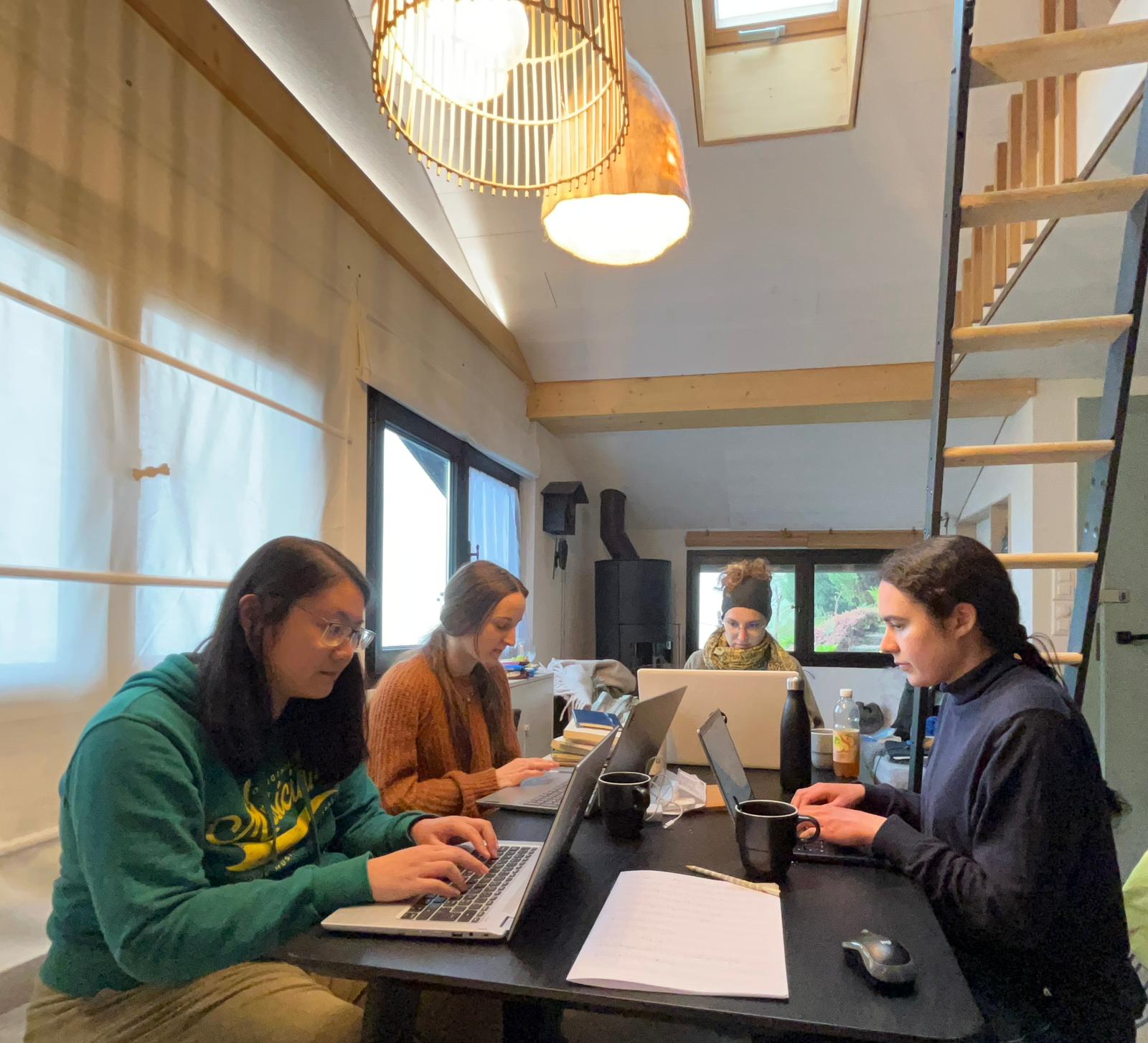
Report by Fiona Kizzie Lee, Lisa Brader, Yamina Wehrli, Elisabeth Scotti, May 2024.
This Writing Retreat was supported by the Graduate School.
We are four PhD Musicology students at different stages of our studies. In May 2024 we went on a 4-day writing retreat in a Chalet on the mountain of Les Avantes (Montreux).
As we are on different progress in our individual projects, we focused on writing our individual projects/papers in the retreat, while supporting one another on discussing and building up daily writing goals, as well as reflecting on our progress and writing patterns at the end of every day.
We wake up every morning with a communal breakfast, and with a small discussion on daily goals. Then, we start working on either the big dining table of the living room, or (when the weather permitted) outside of the chalet in front of the view of mountains and the sounds of cow bells. We have 4 individual working sessions every day, each 90 minutes with a small break in between. Before dinner, we reflect on whether we were able to reach our goals and share interesting new inspirations with one another.
The retreat location is very quiet and secluded, and we were able to soak ourselves in nature while working peacefully on our own projects. In the evenings, we were able to wind down by making dinner together. We were all able to finish our set goals for the 4 days and came home with new inspirations and progress.
European Graduate Network Conference
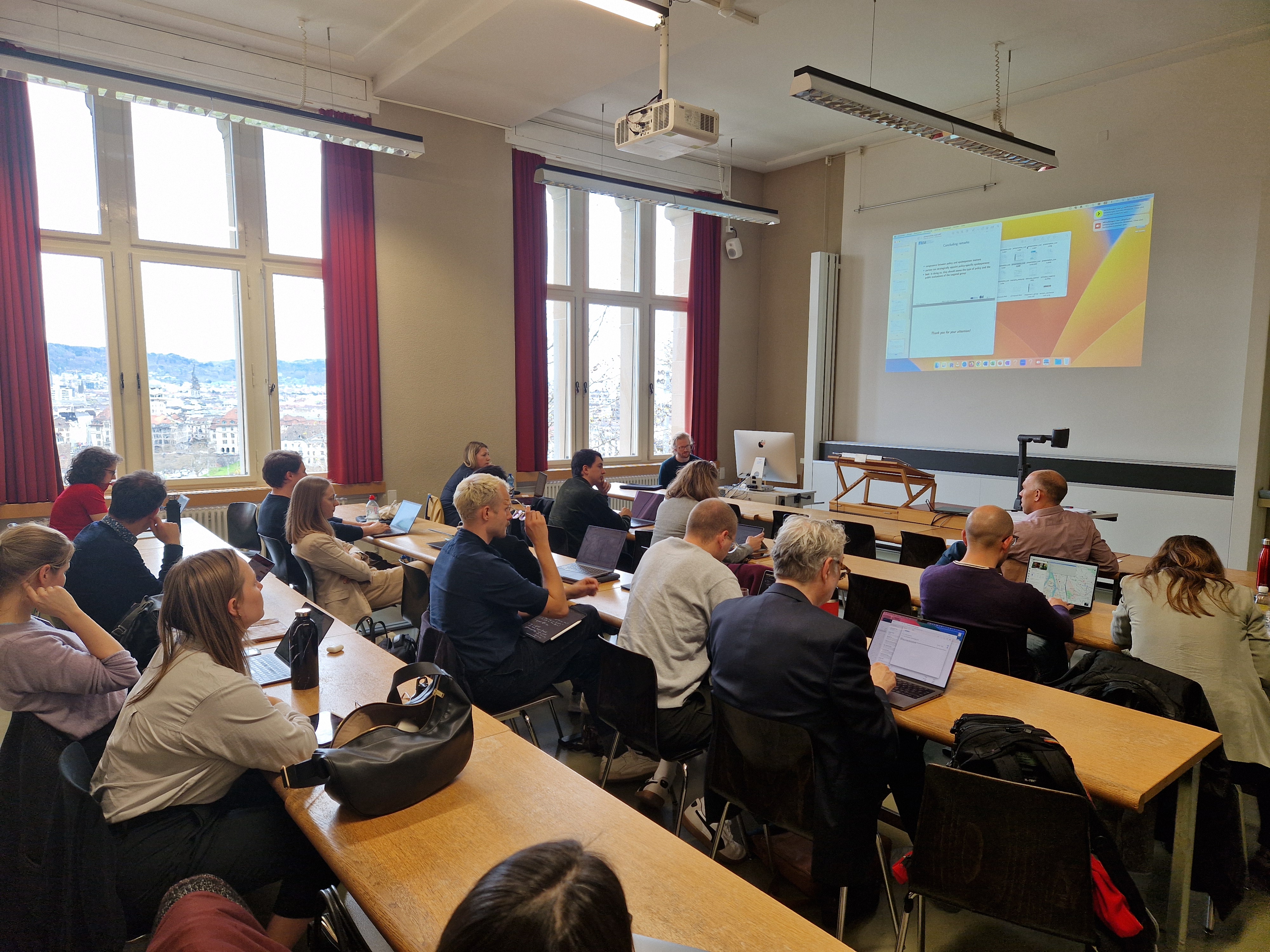
Report by Valeria Vuk, Catarina Trindade Pereira, Valentina Consiglio, Reto Mitteregger, April 2024.
This Self-organized Working Group was supported by the Graduate School.
The European Graduate Network (EGN) is a collaborative network of social scientists from seven European universities: The European University Institute in Florence, the Scuola Normale e Superiore in Florence, the Universitat Pompeu Fabra in Barcelona, the London School of Economics, the Central European University in Vienna, the Berlin Graduate School of Social Sciences, SciencesPo in Paris, and the University of Zurich. Once a year, one of these universities hosts a conference organized by junior researchers to give a chance to network and present research. In April 2024, the 15th EGN conference took place, and for the first time, the conference was hosted by the Political Science Department of the UZH.
42 PhD candidates whose abstracts had been selected from nearly 100 applications, were invited to Zurich. In addition, 10 senior scholars served as chairs and discussants in the thematically grouped panels. Ten panels were held, ranging from conflict studies to political economy. The conference not only consisted of scientific presentations and discussions, but was also enriched by a meta-session on "Reproducibility and Open Science", organized by the Center for Reproducible Science at UZH. Furthermore, one of the main goals of this conference is to provide a unique opportunity for young scientists to network with other researchers. To this end, a graduate student dinner, a conference dinner, and a workshop where participants could exchange ideas about their peer formats were organized.
All in all, it was a very successful conference, which was also a very good and important exercise for us as an organizing team. Planning, organizing, budgeting and then running a conference with about 50 participants is certainly an important experience for an academic career.
Forschungsaufenthalt in Südafrika
Bericht von Lukas Hess, April 2024.
Dieser Forschungsaufenthalt wurde gefördert von der Graduiertenschule.
In meinem Dissertationsprojekt untersuche ich die Auswirkungen der zunehmenden digitalen Überwachung, insbesondere in Bezug auf politisch aktive Personen. Einige prominente Beispiele sind die von Whistleblower Edward Snowden aufgedeckte Massenüberwachung, die invasive Spyware Pegasus der israelischen NSO Group oder die aktuellen Enthüllungen rund um Predator und Intellexa. Um ein tieferes Verständnis für die Funktionsweise des internationalen Marktes für Spionagetechnologien zu entwickeln, reiste ich im Februar nach Kapstadt und Johannesburg. Südafrika ist relevant, da hier verschiedene Firmen invasive Überwachungstools testen, Daten sammeln und automatisierte Systeme trainieren, oft ohne nennenswerten regulatorischen Widerstand. Zivilgesellschaftliche Akteure werden in ihrer Arbeit gezielt behindert oder verfolgt. Die daraus resultierenden Konsequenzen für die politische Partizipation und Demokratie sind verheerend und werden zunehmend deutlicher. Auch die Schweiz ist durch Partnerfirmen und Investitionen in viele dieser problematischen Vorhaben verwickelt, was sich besonders durch die jüngsten Enthüllungen um Intellexa zeigt. In der Schweiz entwickelt sich aktuell ein Hub rund um diese Technologien, und das Land fungiert zunehmend als Drehscheibe für Geschäfte mit autokratischen Regimen, in denen Menschenrechtsverletzungen alltäglich sind. Während meines Aufenthalts führte ich zahlreiche Interviews mit Experten und betroffenen Personen durch und sammelte entscheidende Daten für meine Dissertation. Damit kann ich aufzeigen, wie die Schweiz in diese Branche verwickelt ist und wie Unternehmen die „Swissness“ als Gütesiegel für Neutralität und vermeintlich strenge Regulierung nutzen, um ihre Produkte zu vermarkten. Nun hoffe ich, diese gefährlichen Entwicklungen in meiner Dissertation aufzeichnen zu können, damit die Politik auf Basis dieser Forschung Gegenmaßnahmen diskutieren und ergreifen kann.
Writing Retreat of the Doctoral Students in History
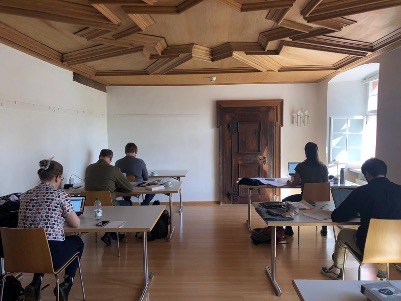
This Writing Retreat in April 2024 was supported by the Graduate School.
Beginning in fall 2023, the graduate students of the history department have organized a weekly writing group. Each session follows the same structure: a brief discussion of session goals, two independent writing sessions separated by a coffee break, and a brief wrap-up. Funded by the Graduate School, this group organized a 3-day retreat in order to expand on this format, work intensively on their dissertations, and discuss the writing process.
The retreat was held at Probstei Wislikofen, a former monastery that provided rooms, meals, and writing spaces. 12 history graduate students at various stages of the dissertation-writing process took part. We followed the same basic format of the writing group, with hour-long sessions that ran from 8 a.m. to 9 p.m., allowing us to experiment with our normal writing times and rhythms.
Each day included group discussions on the writing process. Upon arrival, we introduced ourselves, our projects, and our individual and group goals for the retreat. On the second day, we focused on our personal writing approaches, such as "planners" vs. "free-writers," and the ways in which we can profit from each other’s strategies. On the final day, we discussed the format of the retreat and potential improvements, as well as ways to integrate what we had learned into our normal writing practice. It was universally agreed that the retreat had been highly productive for each of us individually, and that our discussions, both formal and during the breaks, had been illuminating. We all came out of the retreat with new writing tips, better understandings of our normal writing rhythms, and plans for our next steps.
Forschungsaufenthalt in Varanasi
Bericht von Sebastian Meier, März 2024.
Dieser Forschungsaufenthalt wurde von der Graduiertenschule gefördert.
Protagonist meines Dissertationsprojektes ist der indische Philosoph MM Gopinath Kaviraj (1886-1976) welcher den grössten Teil seines Lebens in Varanasi verbrachte. Nach einer ersten Phase der Auseinandersetzung mit Leben und Werk des Protagonisten und der theoretischen Einbettung meines Forschungsgegenstandes am Schreibtisch war für mich das Kennenlernen von Kavirajs Wirkungsfeld in Indien ein zentraler Schritt.
Auch wenn die ersten beiden Wochen in Varanasi noch etwas geprägt waren von einer nicht vollständig auskurierten Bronchitis aus der Schweiz (die Luftqualität und die Lärmbelastung machten mir zu schaffen!) ergaben sich schon zu Beginn dieses Aufenthaltes wichtige Begegnungen mit Personen, die Kaviraj noch persönlich kannten. Dazu zählen Dr. Marc Dyczkowski und Dr. Bettina Bäumer, beide Indologen und Kenner auf dem Gebiet des Trika-Śivaismus von Kaschmir (ein Forschungsgebiet welches Kaviraj selber mitprägte). Durch ein einstündiges Interview mit Bettina Bäumer erfuhr ich, dass sich Kavirajs Nachlass im Indira Gandhi National Center for the Arts (IGNCA) befindet. Durch Kontakte mit wichtigen Schlüsselfiguren im Feld ergaben sich weitere aufschlussreiche Interviews mit Schülern von Kaviraj, die mir auch einen erweiterten Blick auf dessen menschliche und spirituelle Seiten ermöglichten. Ebenso durch Vitamin-B wurde mir Zutritt ins IGNCA in Delhi gewährt, wo ich erste Samplefotos von Kavirajs Handschriften (hauptsächlich in Bengali) machen konnte.
Forschungsaufenthalt in Australien
Bericht von Andrea Riepl, März 2024.
Dieser Forschungsaufenthalt wurde von der Graduiertenschule gefördert.
Dank der Unterstützung der Graduiertenschule konnte ich einen Forschungsaufenthalt im Januar 2024 in Brisbane und im März 2024 in Sydney realisieren und Forschungskolleg:innen des internationalen Forschungsnetzwerkes CUWB (Children’s Understandings of Well-Being) besuchen, in welches meine Dissertation zum Thema «Capabilities & Well-Being – eine ungleichheitstheoretische Perspektive auf (un)sichtbare Kindheiten» eingebettet ist.
Im Januar 2024 habe ich mit Dr. Emma Cooke an der University of Queensland in Brisbane zusammengearbeitet und meine Dissertation, die sich momentan in der Schreibphase befindet, intensiviert, da Emma viel Schreiberfahrung mitbringt und ihre Idee des Creative Writing mich interessiert hat. Zusätzlich habe ich von Emmas Forschungsteam in Brisbane profitiert, indem ich die interdisziplinäre Teamarbeit beobachten sowie meine Dissertation vorstellen und zur Diskussion stellen konnte. Aus dem Forschungsaufenthalt hat sich ein gemeinsamer Artikel ergeben, sodass die internationale Zusammenarbeit auch nachhaltig bestehen bleibt.
Im März 2024 habe ich Associate Professor Dr. Tobia Fattore an der Macquarie University in Sydney besucht, der die Co-Projektleitung im CUWB innehat. Es ergab sich die Möglichkeit meine Dissertation in einer Seminarserie vorzustellen, in welcher ich konstruktives Feedback für den zweiten Artikel der Dissertation bekommen habe. Ausserdem habe ich mit Tobia intensiv methodische und ethische Herausforderungen des Netzwerkes diskutiert und viel von ihm gelernt. In dieser Zeit habe ich auch weitere australische Mitglieder des CUWB getroffen und es hat sich daraus eine Zusammenarbeit und Vernetzung für meine akademische Zukunft ergeben. Herzlichen Dank an die Graduiertenschule für die finanzielle Unterstützung dieser für mich lehrreichen und unvergesslichen Reise!
Forschungsreise nach Kolumbien und Italien
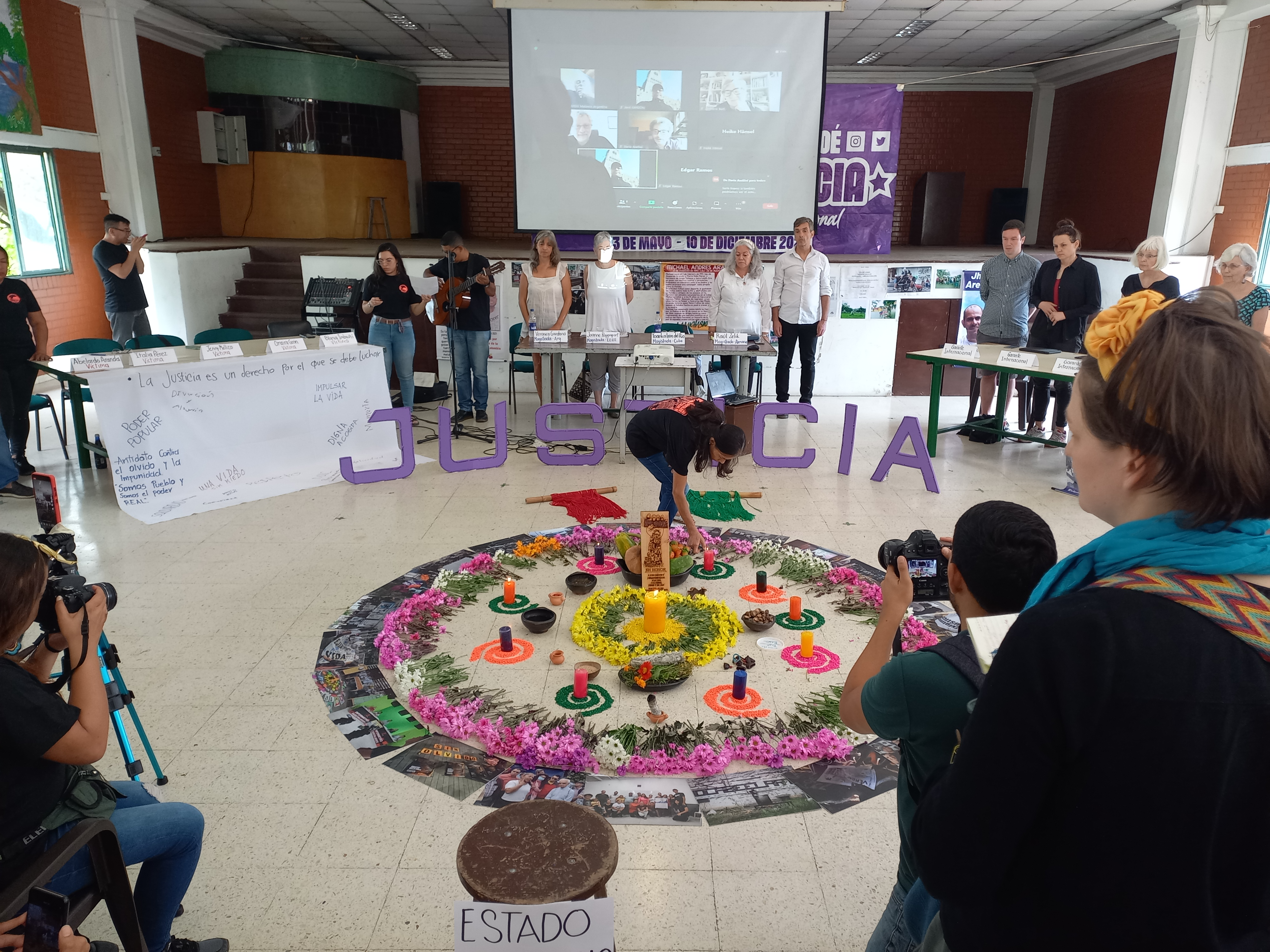
Bericht von Madlyn Sauer, Dezember 2023.
Dieser Forschungsaufenthalt wurde von der Graduiertenschule gefördert.
In meinem Dissertationsprojekts »Doing Justice: The Practice and Politics of Civil Society Tribunals« untersuche ich anhand verschiedener Fallstudien die weltweite Praxis der sozialen Bewegung schwere staatliche Menschen,- Völkerrechts- und Umweltverbrechen im Rahmen eines selbstorganisierten, symbolischen Tribunals öffentlich zu untersuchen und anzuklagen. Teil meiner Forschung ist das »Permanent Peoples´ Tribunal«. Dazu reiste ich im Februar 2023 für zwei Monate nach Kolumbien (Bogotá und Calí), und verbrachte einen weiteren Monat im September 2023 in Rom. Ich führte 35 Interviews, besuchte regelmäßige das »Centro Nacional de Memoria Histórica« und nahm in Calí an der Abschlusssitzung des lokalen Tribunals, dem »Tribunal popular en Siloé« teil, in welchem die staatliche Gewalt und Verbrechen während des Generalstreiks 2021 untersucht wurden. Im zweiten Teil meiner Forschungsreis studierte ich im Archiv der »Fondazione Lelio e Lisli Basso« in Rom Dokumente zu einzelnen Sitzungen des Permanent Peoples Tribunals sowie zur Entstehung und Entwicklung dieser zivilgesellschaftlichen Institution.
Die Forschungsreise war ein entscheidender Schritt für meine Arbeit. Sie ermöglichte direkte Einblicke in die Schlüsselorte und -akteure meiner Untersuchung. Die intensiven Gespräche in Kolumbien und die Teilnahme am lokalen Tribunal verliehen meiner Arbeit eine lebendige, praxisnahe Perspektive. Diese Einblicke direkt vor Ort, gepaart mit der vertieften Analyse im Archiv der »Fondazione Lelio e Lisli Basso« in Rom, ergänzten sich ideal.
Research Trip to New York
Report by Alessa Widmer, October 2023
This Research Stay was supported by the Graduate School.
In November 1974, Rosellina Burri-Bischof (1925-1986), the protagonist of my dissertation, set off on an "US research trip". According to her itinerary, she wanted to visit American photography museums and collections in order to gather inspiration for the newly founded Photography Foundation in Switzerland (Fotostiftung Schweiz). Among others, she visited the Smithsonian Institution in Washington D.C., the George Eastman House in Rochester, NY and the ICP in New York. These institutions were now also on my itinerary of the places to visit during my two-month stay. By visiting a total of ten archives and collections in New York State and the surrounding area, I was able to view a large number of photographs, documents and correspondence that could close the existing gaps in my previous research. The many exciting impressions were complemented by the exchange with photo historians at Rutgers University in New Brunswick, NJ. I was able to look at my previous research results from a new perspective. My stay in New York also gave me the opportunity to participate in the local art scene: exhibitions in galleries and museums, artist talks, openings, book launches, art fairs... there was always something to discover and see, which led to some new contacts. These also opened new doors for my research: for example, I got to know an art collector who referred me to a private archive that had not yet been part of my research. During these two months - which unfortunately felt far too short - I was able to take a big step forward with my dissertation on several levels and will certainly remember this exciting and impressive stay for many years to come.
Report Research Stay at Vrije Universiteit Amsterdam
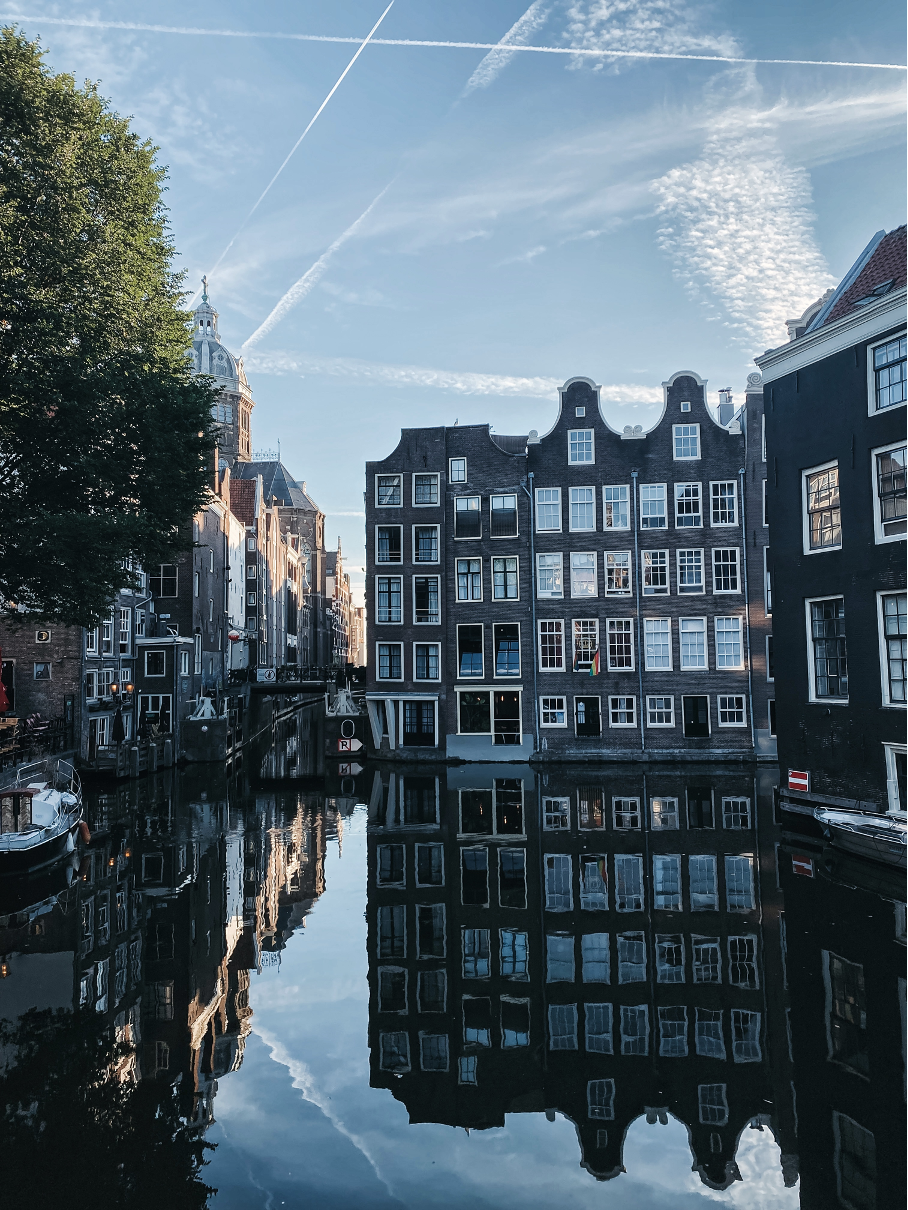
Report by Lisa Dillinger, Oktober 2023
This Research Stay was funded by the Graduate School.
During my stay in Amsterdam I was able to attend several talks and conferences related to my topic of democratic education. Especially the Conference on “Controversial Issues in the Classroom” proofed to be immensely valuable not only because of the international experts, multitude of perspectives and approaches to the topic but also because of the connections I made there. I was able to have in-depth conversations with advanced researchers and professors working on this topic concerning their, as well as my own research. In these discussions I was able to test some of my own working hypothesis and got constructive feedback on how to incorporate these ideas into the existing discourse on democratic education.
Meanwhile, learning about the dutch school system and the way it handles questions of civic education was most valuable to also understand more about the Swiss context and in which way different democratic models pose different challenges to democratic education.
Report Research Stay in Rome
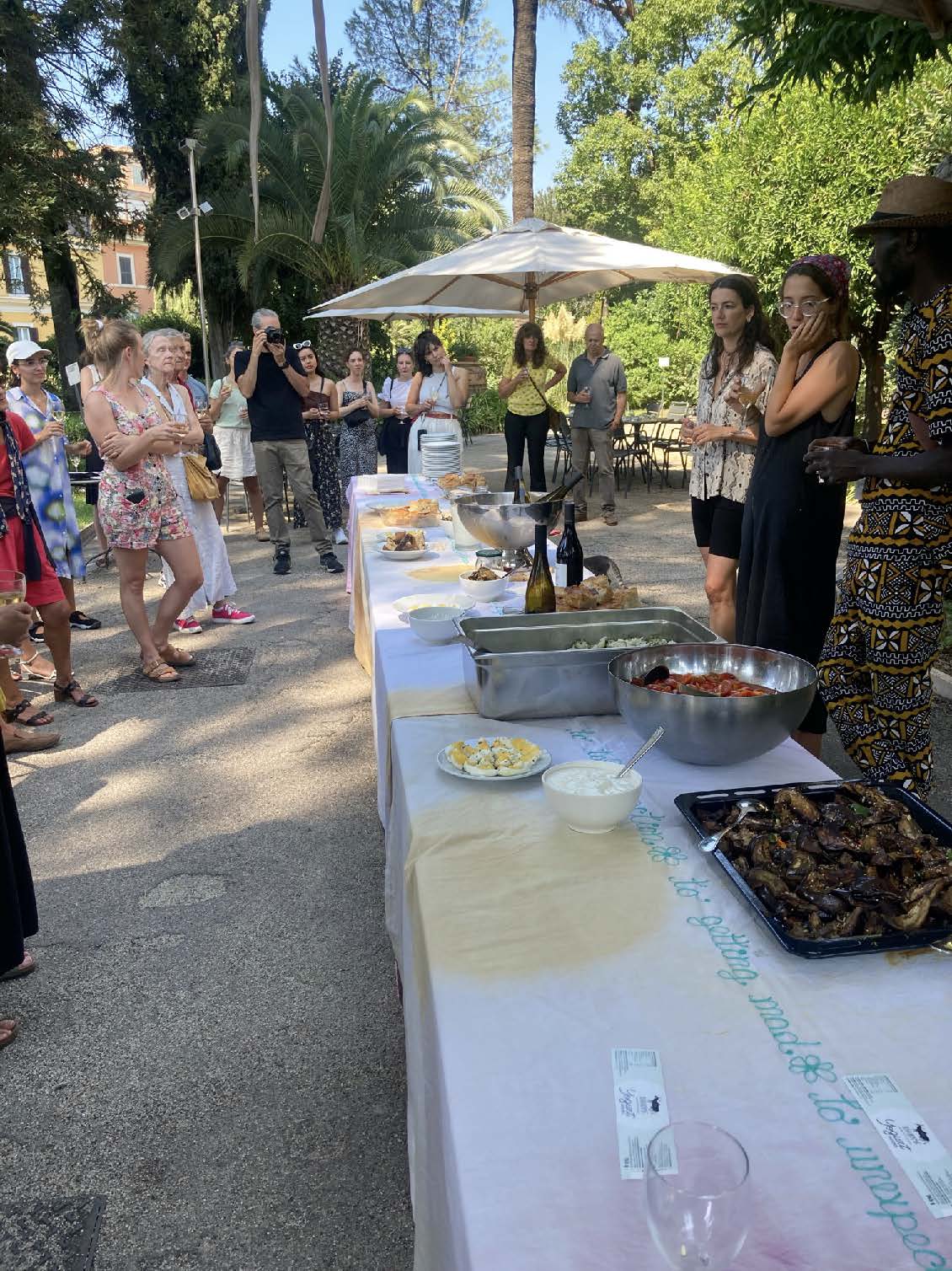
Report by Michelle von Dach, September 2023
This Research Stay was supported by the Graduate School.
In-depth network analysis
Thanks to my stay in Rome, I was able to start the network analysis, which has already provided me with very interesting results for my research. I conducted five interviews, which for a two-week stay is a good result that I am satisfied with. Certainly, this project will have to continue with further interviews on another visit in Rome. In addition to the above, the stay in Rome was fruitful because I participated in many other activities that were useful for my research.
Summer School Art and Activism
During the first week, a group of ZHdK students came to Rome. They were interested in practices that combine "Art and Activism". The curators included me in the summer school’s program. In the organization there was a visit to the occupied social center, SPIN TIME where during my fieldwork last year, I used to meet other activists and participate to activities such as the legal desk, where volunteers and lawyers were giving legal advices to migrants. The photograph shows the final event organized to conclude the summer school, in which a joint lunch was prepared in collaboration with a collective called “Barikama”, founded by a group of young West Africans who, having arrived in Italy by inflatable boat, found themselves working in the fields of southern Italy exploited for a few euros. A fierce uprising broke out in Rosarno in January 2010 against racism, forced labor, and the exploitation of farm laborers, and many of them found themselves in Rome's Termini train station. Today they run the social cooperative and they produce biological products.
Meeting climate activists
“Nuova generazione” is the activist group that was recently mentioned throughout the whole media for having thrown soup on a famous Van Gogh painting in Rome. More recently, members of the group used a charcoal-based powder to dye the water of the Barcaccia Fountain in front of the Spanish Steps.
Meeting with activists in the field of migration
Every evening, volunteers of the assiciation “Baobab Experience” distribute dinner to migrants (mainly living in the street) at its presidium.
“A bordo” festival
Organized by Mediterranea Saving Humans, the festival took place at the “Città dell’Altra Economia”. It was four days filled with workshops, discussions, artistic and cultural activities and concerts.
Report Writing Retreat “Rethinking Art History through Disability”
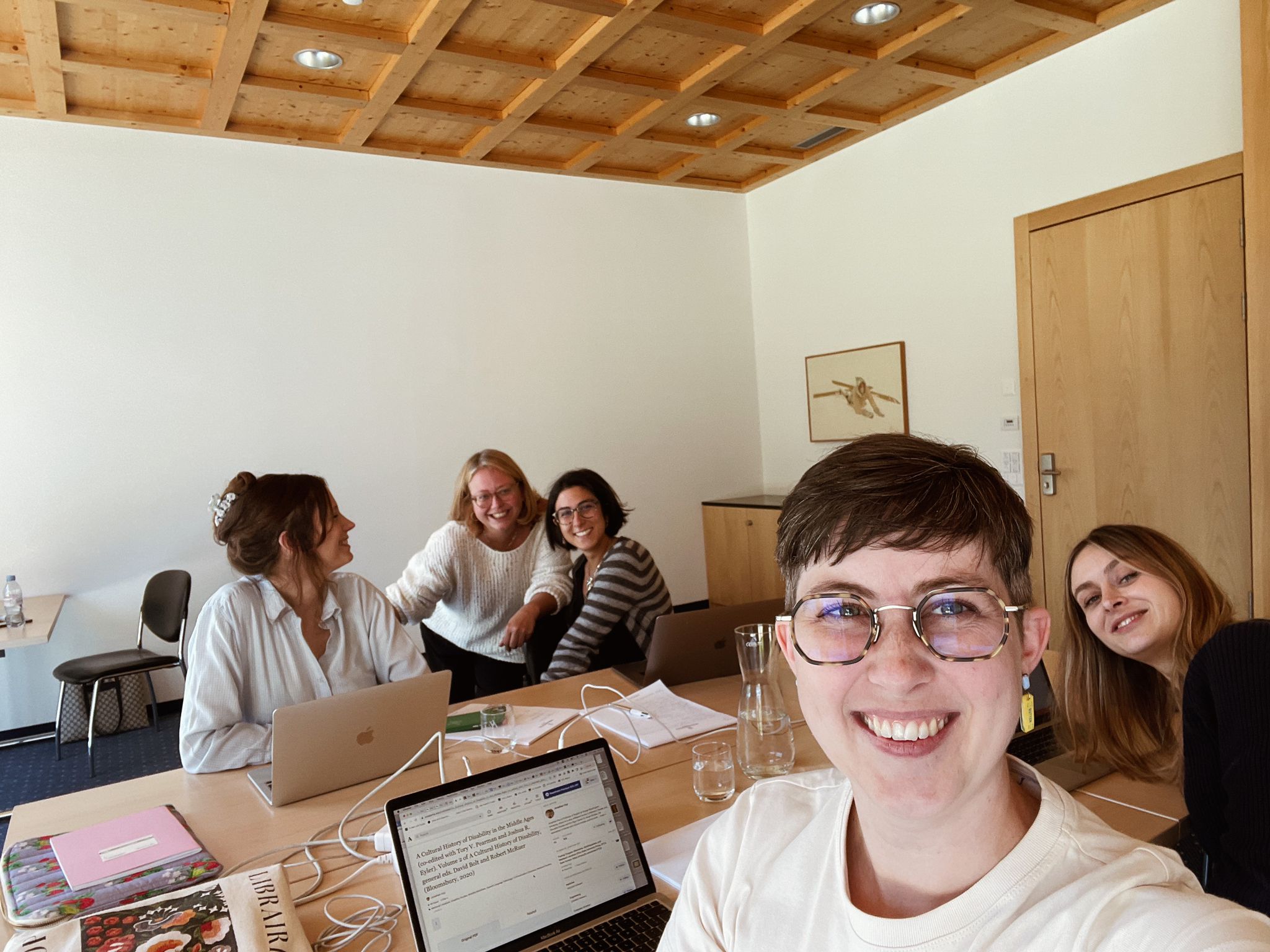
This retreat in September 2023 was supported by the Graduate School through a grant for self-organized working groups.
The research team—comprising Jess Bailey, Nora Guggenbühler, Virginia Marano, Charlotte Matter, and Laura Valterio—successfully concluded a multi-day writing retreat funded by the Graduate School grant for self-organized working groups. The retreat was designed as a collaborative space for advancing our ongoing research project, “Rethinking Art History through Disability.” It took place in the beautiful mountains in Arosa, in the Grisons canton. During the retreat, we engaged in comprehensive brainstorming sessions where we selected relevant case studies for our upcoming publications. This was coupled with rich discussions to debate potential contributors and to finalize our academic approach for the project. We also took the time to review several publishers and outlined a draft for our book proposal. Among the retreat’s outcomes were the development of a draft outline for an edited book and the alignment on themes and contents for a special issue in an academic journal. The Graduate School grant proved to be invaluable, allowing us the focused time and space required to delve deep into our research objectives. In summary, the writing retreat was a notably productive experience that exceeded our expectations. It offered a fertile ground for academic growth and is expected to make a significant contribution to the intersecting fields of art history and disability studies, thereby filling a long-standing academic gap.
Report Research Stay at Peking University, China
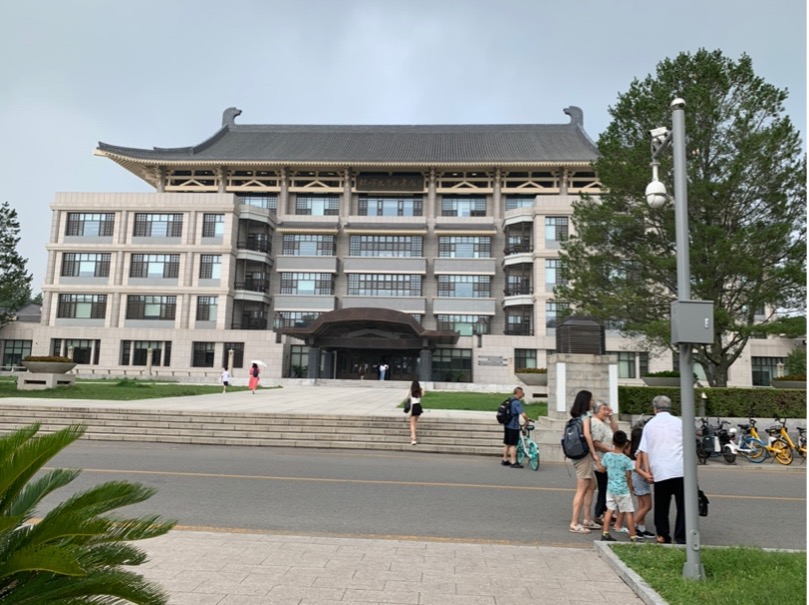
Report by Sujie Jin, July 2023
This Research Stay was supported by the Graduate School.
During my research stay at Peking University, I expanded my knowledge of the subculture of Chinese online fiction and developed a deeper understanding of the academic perspective on this emerging field. Professor Yanjun Shao, a leading scholar in Chinese Internet literature, supervised my research throughout this time frame.
Collaborating closely with Prof. Shao and her research team, I actively participated in activities related to Chinese online fiction and its fan communities. By participating in their discussion concerning an upcoming book, I broadened my insights into the intricate relationship between Chinese academia and the subculture of online fiction. I was also granted access to a wealth of materials and books at the Peking University Library and other organizations, which were not readily available elsewhere.
My participation in the Triennial Writers’ Conference, hosted by Jinjiang Literature City—the largest female-oriented fiction website—proved invaluable. The engagement with website managers and fiction writers facilitated a more profound comprehension of the dynamics of online fiction production and consumption, as well as the complex interplay between writers and online platforms. Beyond that, I undertook thorough conversations with established scholars, young researchers, and relevant individuals, fostering crucial connections for future research and collaboration. Meanwhile, I seized opportunities to investigate offline subcultural activities. I explored themed cafes, subculture stores, and the writers’ village in Hangzhou, Zhejiang Province, which provided insights into the world of fiction enthusiasts.
In summary, my time at Peking University was a multifaceted exploration that encompassed academic collaboration, field research, and networking. This comprehensive approach significantly enhanced my knowledge and laid a solid foundation for my current PhD project.
Bericht Karrierecoaching mit Schwerpunkt Präsentationsstil und anschliessender Praxisanwendung an einem internationalen Kongress

Bericht von Nina Kaderk, Virginia León Torrez, Chiara Licci und Laura Sánchez
Die Arbeitsgruppe wurde von der Graduiertenschule durch Fördergelder für selbstorganisierte Arbeitsgruppen unterstützt.
Im Juli 2023 (10.07.-15.07.) fand in Neuchâtel der XXI. Kongress des Internationalen Verbandes der Hispanisten (AIH) (https://www.aihneuchatel2022.com/) statt. Dort haben wir ein Symposium zum Thema «Gewalt und Frauen in der Literatur» vorgestellt. Jede von uns hat ihre literarische Analyse zu einem lateinamerikanischen oder spanischen Text des 20. und 21. Jahrhunderts präsentiert, welche auch Teil unserer Doktoratsprojekte sind. Dabei hat auch als weitere Vortragende Prof. Itzíar López Guil der Universität Zürich teilgenommen.
Um unsere Vortragskompetenzen zu verbessern, haben wir vor dem Kongress ein Coaching-Projekt mit María Teresa Vera-Rojas organisiert, Angehörige der Universität der Balearen und spezialisiert auf zeitgenössische Literatur der Karibik, Venezuelas und Spaniens mit dem Fokus auf Feminismus und Gender Studies. Konkret haben wir unsere Präsentationen gegenseitig vorgetragen, wobei Frau Vera-Rojas ihre Expertise zu unseren Vortragsausführungen aber auch zum behandelten Thema eingebracht hat, was sehr hilfreich war. Ausserdem haben sich diese Treffen als sehr wertvoll erwiesen, um auch Verknüpfungspunkte zwischen unseren Analysen festzulegen, welche uns auf die am Ende des Symposiums vorgesehene Diskussionsrunde vorbereitet haben. Denn Frau Vera-Rojas hat uns am Kongress auch als Moderatorin begleitet. Anschliessend, nach der Teilnahme, haben wir uns in einer Feedback-Runde über das Symposium und die aus der Diskussion entstandenen Themen ausgetauscht. Ausserdem hatten wir am Kongress die Möglichkeit, uns mit anderen Peers zu vernetzen. Für die finanzielle Unterstützung möchten wir der Graduiertenschule herzlich danken.
Report Research Stay Stockholm University
Report by Léna Mudry, July 2023
This Research Stay was supported by the Graduate School.
The Philosophy Department at Stockholm University is hosting the project “Knowledge Resistance: Causes, Consequences and Cures”, led by Prof. Åsa Wikforss. Focusing on daily scepticism, it is an interdisciplinary project, closely tied to my research interest on suspension of judgement. The purpose of my visit was to benefit from their expertise in order to write a chapter of my dissertation on climate scepticism and motivated cognition. I had the opportunity to present and discuss my work at the group’s seminar. It greatly improved thanks to their feedbacks; it is now under review at Philstudies. As part of this project, I had the opportunity to take part in a two-day interdisciplinary workshop, engaging with the work of social psychologists and political scientists on the issue of knowledge resistance.
Overall, the philosophy department in Stockholm proved to be a very stimulating place to work. I attended several conferences related to my research interests (including Máté Veres, Tricia Magalotti, Levi Spectre, Graham Oddie). I also attended the PhD-seminar where I could engage with other PhD students’ work. And I took part to a writing group. These different opportunities allowed me to make progress in other chapters of my dissertation.
I took the opportunity of being in Sweden to visit Uppsala University and meet Andrew Reisner. An important philosopher in my field whose research I discuss in an earlier chapter of my dissertation. Reisner's research group and my research group (ZEGRa) in Zurich recently decided to strengthen their links. A first meeting (workshop) took place in Zürich in May 2023.
I’m confident to have built lasting professional relationships. And I’m looking forward to meet and work again with them in the future.
Bericht Retraite: Netzwerk zur Karriereförderung von Nachwuchswissenschaftlerinnen in Literaturwissenschaft und Linguistik (Li*Li)
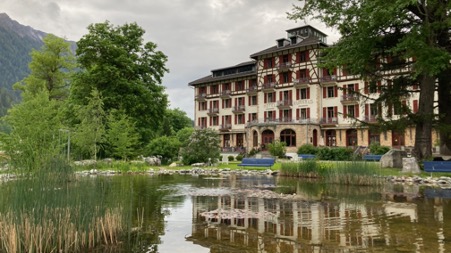
Die Arbeitsgruppe wurde von der Graduiertenschule durch Fördergelder für selbstorganisierte Arbeitsgruppen unterstützt.
Das im HS21 gegründete Netzwerk zur Karriereförderung von Nachwuchswissenschaftlerinnen in Literaturwissenschaft und Linguistik (Li*Li) richtet sich an FINTA*-Doktorierende und -Postdoktorierende aus der deutschen Literatur- und Sprachwissenschaft, die eine Karriere in der Wissenschaft anstreben. Das Ziel des Netzwerks ist es, die Mitglieder optimal auf die Anforderungen einer akademischen Karriere in der Literatur- und Sprachwissenschaft vorzubereiten und dabei zum einen die Besonderheiten germanistischer Institute zu berücksichtigen, zum anderen die wissenschaftlichen Karrieren von Frauen und allgemein FINTA* in diesem Fachbereich aktiv zu fördern. Um die gezielte Karriereförderung für Nachwuchswissenschaftlerinnen in Literaturwissenschaft und Linguistik zu erreichen, möchte das Netzwerk Mitglieder in unterschiedlichen Karrierephasen ansprechen und miteinander vernetzen.
Dank der Förderung durch die Graduiertenschule konnte neben den regelmäßigen Netzwerktreffen im Sommer eine Retraite im Kurhaus Bergün durchgeführt werden. Innerhalb dieses sicheren Rahmens fernab der universitären Räumlichkeiten konnte gemeinsam an den geplanten Programmpunkten Bystander-Training und Peer-Feedback gearbeitet werden. In das Prinzip des Bystander-Trainings wurden wir im FS 2023 von Deborah Mühlebach und Malin Plikat von der Koordinationsstelle Persönliche Integrität an der Universität Basel eingeführt. Die Erkenntnisse dieses Workshops flossen während der Retraite in Fallsimulationen ein, auf denen der ebenfalls während der Retraite entstandene Entwurf eines Manuals für konstruktive Zusammenarbeit an der Universität Zürich beruht, das mittelfristig in der KWNW vorgestellt werden soll. Damit möchte das Netzwerk den gesamten Mittelbau an der durch die Graduiertenschule geförderten Arbeit teilhaben lassen. Daneben konnten Formate des Peer-Feedbacks eingeübt werden, das ebenfalls ein zentrales Instrument unserer Vision guter wissenschaftlicher Praxis bildet. Darüber hinaus ist eine Checkliste zur Tagungsorganisation entstanden, die insbesondere von Frau Pierstorffs (Postdoktorandin) Erfahrungen profitierte.
Report Research Stay University of Haifa
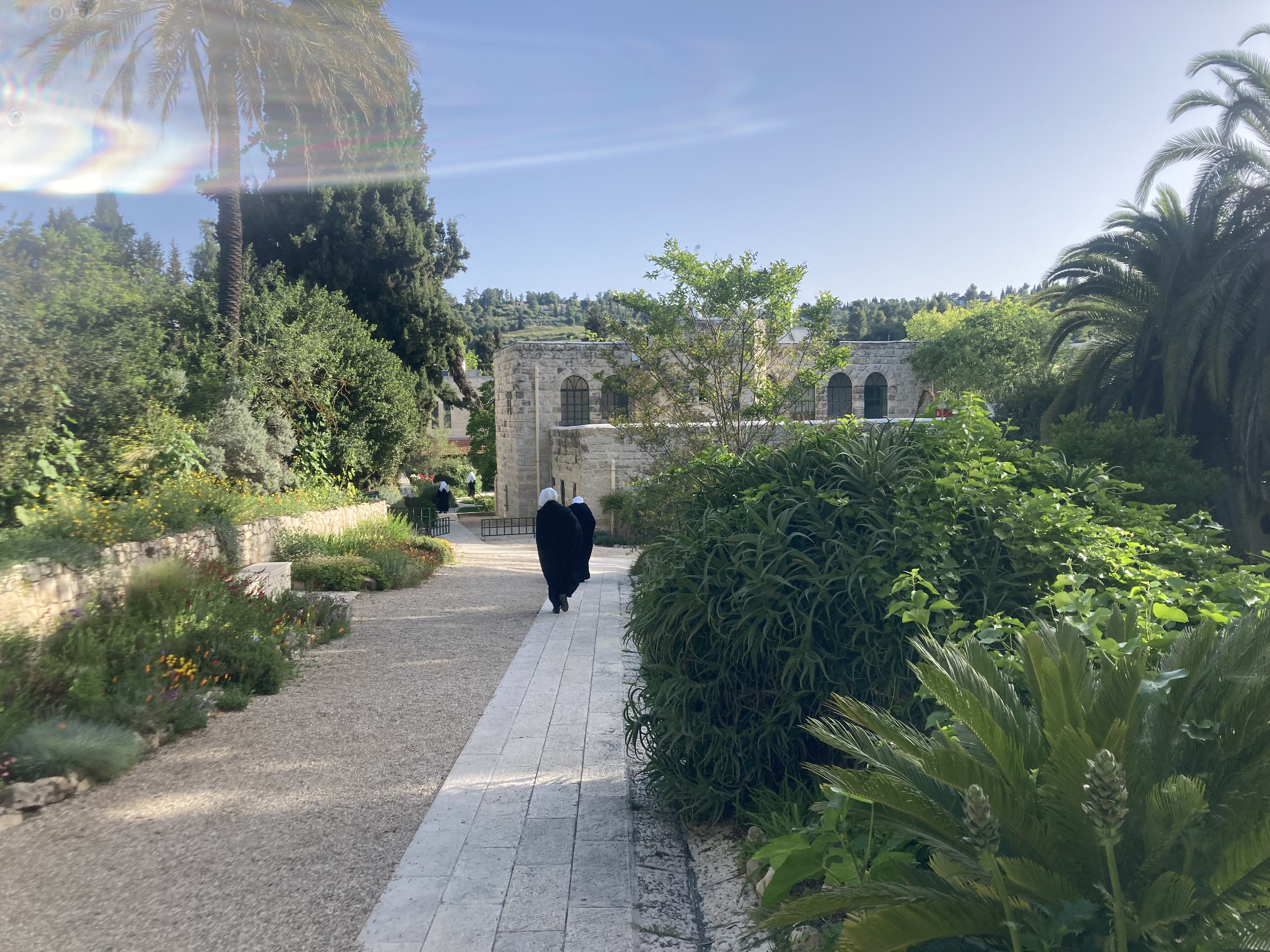
Report by Jan Danko, July 2023
This Research Stay was supported by the Graduate School.
I had the privilege of visiting the University of Haifa and working with the research team led by Dr. Oren Golan. The team has been conducting research on Digital Religion that align closely with my own research, particularly in the areas of digital media usage among bounded religious communities. The University of Haifa's location in the Holy Land allows the research team to closely study religious communities, distinct from those we have in Switzerland, including the Litvak Haredi, Chabad Hasidim, the Zionist religious, as well as Franciscan communities in the Holy Land.
Staying in the Holy Land provided me with an outstanding opportunity to immerse myself in the religious context and visit over a dozen monasteries, engaging in conversations with numerous monastics from diverse orders, including Benedictines, Franciscans and Greek-Orthodox monastics. During extended ethnographic fieldwork at two monasteries, I could deepen our understanding of how these communities negotiate and integrate digital media into their lifestyle.
The stay at the University of Haifa allowed me to return with two paper projects. The first stemmed from interviews and fieldnotes in the Holy Land, combined with insights from the monasteries previously investigated in Europe. The paper focuses on how monastic communities integrate digital media, shedding light on how traditional religious communities legitimate new media usage. The second project is based on an extensive quantitative study I conducted with my Supervisor Prof. Katja Rost, with special attention to the impact of digital transformation on internal organizational dynamics of monastic orders, comparing diverse monastic traditions. Through my stay at Holy Land monasteries, I was able to supplement the scope of the European project with comparative data. Overall, through collaboration with Oren Golan as an expert on the digitalization of religious communities, we were able to enhance our findings with his ethnographic expertise and knowledge of the sociology of digital religion.
At the University of Haifa I thoroughly enjoyed the welcoming environment and was glad to enrich my insights into another academic culture and research cadre. With Oren, I met almost daily and could intensely work on my projects. I furthermore broadened my network at interreligious events supported by the University of Haifa’s Laboratory for Religious Studies. Furthermore, I took part in a conference on religion and science that was held at the Hebrew University in Jerusalem, which brought together leading scholars from Israel, Europe and the US.
I am immensely grateful for the opportunity to undertake this research stay and I would like to extend my heartfelt thanks to Dr. Oren Golan for inviting me, for his guidance and for introducing me to new tools, concepts and methodologies. Likewise, I am immensely grateful to my Supervisor Prof. Katja Rost, who encouraged my stay abroad, for her trust and support. Moreover, I would like to express my gratitude to the Grant Committee for their generous support, without which this stay would not have been possible.
I would decisively encourage other advanced doctoral students to undertake a research stay abroad and thus further their empiric scope and academic horizon.
Report Research Stay at Georgetown University in Washington D.C.
Report from Valérie Brauchli, June 2023
This Research Stay was supported by the Graduate School.
During my 9-week research stay at Georgetown University in Washington, D.C., under the supervision of Professor Dr. Rachel Barr, I had the opportunity to deepen my knowledge and understanding of children and digital media, which is the focus of my dissertation. The relevance of this research stay for my academic career was multi-faceted.
Working with Professor Barr, an expert in the field, provided me access to cutting-edge research and knowledge. I actively participated in regular meetings, where I shared my project experiences and gained valuable insights from other ongoing projects in their lab. These interactions broadened my perspectives and enriched my understanding of my research topic.
One of the highlights of my stay was the opportunity to meet and connect with prominent researchers in the field of children and digital media. These encounters allowed me to establish meaningful contacts and expand my professional network, which will be advantageous for future collaborations and career prospects.
Throughout my research stay, I maintained regular communication with Professor Barr, benefiting from her guidance and great expertise. Her input was invaluable during the preparation of my third paper's manuscript. The exchange of ideas and feedback greatly contributed to improving the quality of my research.
In conclusion, my research stay at Georgetown University provided me with a transformative experience, which I only can recommend to any PhD student. It deepened my knowledge, expanded my professional network, and enhanced the quality of my research. I am confident that the knowledge I gained during my research stay not only enriched my academic career, but also enhanced my personal growth.
Special thanks to the University of Zurich for their generous support of my research stay!
Research Stay Report University College London
Report from Simone Sebben, June 2023
This Research Stay was supported by the Graduate School.
I visited Henrik Singmann, Dave Lagnado, and their labs at UCL (Division of Psychology and Language Sciences, Experimental Psychology). As we explored several possibilities for research projects on topics related to uncertainty, causality, reasoning, and explanation, we stumbled upon some fundamental questions concerning how people make probability judgments. So, we developed an experimental task to investigate probability judgments and betting decisions under various conditions of interest. We conducted two studies and presented initial results at a lab meeting. Together with Victor Btesh, Henrik, Dave, and I are currently planning a third study. The resulting article will be submitted for publication later this year.
My visit at UCL was a fantastic and enriching experience. I particularly enjoyed the welcoming and stimulating environment, the lab meetings, the cognitive and statistical modelling group, the first day of the Heuristics and Causality in the Sciences conference, and the many fun conversations over lunch. I learnt a lot from many different people: Special thanks go to Henrik, not only (but also) for introducing me to lab.js, JATOS, and ggbeeswarm. I really enjoyed and greatly appreciate all my interactions with Maria at security, Hasan at the café, Henrik, Dave, Victor, Charlie Pilgrim, Vanessa Cheung, Maximilian Maier, Calvin Deans-Browne, Trisevengi Papakonstantinou, Tianshu Chen, Maarten Speekenbrink, Christos Bechlivanidis, Matija Franklin, Adam Harris, and everyone else I met at UCL.
I am very grateful for this experience, and I look forward to many further discussions, collaborations, and board game evenings with my friends and colleagues at UCL. Thanks to Dave and Henrik for inviting me. This stay would further not have been possible without the Research Stay Grant from the Graduate School at the University of Zurich (thanks to Maike Krannich for bringing it to my attention) and without support from my PhD supervisor Johannes Ullrich.
Bericht Forschungsaufenthalt: Institut national d'histoire de l'art (INHA), Paris
Bericht von Sina Knopf, Mai 2023
Dieser Forschungsaufenthalt wurde durch die Graduiertenschule finanziell gefördert.
Von Ende März bis Ende Mai 2023 war ich im Rahmen meines Doktorates im Bereich der Kunstmarkt- und Provenienzforschung als Gastforscherin am Institut natonal d’histoire de l’art (INHA) in Paris. Das Ziel des Forschungsaufenthaltes war neben dem fachlichen Austausch vor allem die Konsultierung und die systematische Auswertung von Dokumenten zu verschiedenen Aspekten des Kunsthandels und einzelner AkteurInnen während des Zweiten Weltkrieges in französischen Archiven im Großraum Paris. Die Ansiedlung am INHA war aufgrund der infrastrukturellen und personellen Rahmenbedingungen als zentrale Forschungseinrichtung für Kunstmarkt- und Provenienzforschung in Frankreich ausgezeichnet. Der Austausch mit zahlreichen ExpertInnen und die Hilfestellung durch das Institut bei verschiedenen aufkommenden Problematiken, vor allem in Bezug auf die französische Archivlandschaft, habe ich während meines Aufenthaltes sehr geschätzt und konnte dadurch die geplanten Meilensteine für das Promotionsprojekt erreichen. Für die Offenheit, das Teilen von Archivmaterial und der Vernetzung zu Forschenden bin ich sehr dankbar. Durch die vom INHA veranstaltete Seminarreihe Patrimoine spolié pendant la période du nazisme (1993-1945) – Conséquences, mémoires et traces de la spoliation konnte ich neben der Vernetzung innerhalb der französischen Wissenschaftsgemeinschaft, zudem verschiedene französische Forschungsthemen und bis dato bestehende Desiderate kennenlernen, die sich thematisch mit meinem Promotionsprojekt überschneiden und in einzelnen Aspekten von Relevanz sind.
Research Stay Report University College London
Report from Valeriia Perepelytsia, May 2023
This Research Stay was supported by the Graduate School.
Between 01.02.2023 and 31.03.2023, I had the privilege of conducting a research visit to the Department of Speech, Hearing, and Phonetic Sciences at University College London. During my visit, I was fortunate to be hosted by two experts in the field of speech and voice perception, Prof. Carolyn McGettigan and Dr. Emma Holmes, whose research interests and methods closely align with my PhD research. My doctoral work focuses on the effects of age and audio quality on speech and voice perception. I also study how the brain processes familiar and unfamiliar voices in younger and elderly individuals using electroencephalography (EEG). Given Prof. McGettigan and Dr. Holmes' extensive expertise in studying the neural mechanisms of speech and voice perception using various neuroimaging methods such as EEG, magnetoencephalography (MEG), and functional magnetic resonance imaging (fMRI), their feedback on the experimental design of my studies and analysis of neuroimaging data proved invaluable for my PhD project.
During my visit, I had the opportunity to present my research to the hosting groups and engage in fruitful discussions and implement their suggestions in my analysis pipelines. Additionally, I expanded my research network and deepened my knowledge of EEG data preprocessing and analyses, which are critical to successfully completing my PhD studies. Working in a new environment and collaborating with other academics was an enriching experience that broadened my understanding of academia and provided me with inspiration for future work. Based on my experience, I highly recommend undertaking research stays at different institutions and in different countries as it allows to broaden one's knowledge and skills and engage with diverse perspectives in academia.
Bericht Forschungsaufenthalt: University of North Carolina at Chapel Hill, USA
Bericht von Michelle Roth, April 2023
Dieser Forschungsaufenthalt wurde durch die Graduiertenschule gefördert .
Seit rund zwei Wochen bin ich nun zurück in der Schweiz und blicke mit grosser Begeisterung zurück auf meinen Forschungsaufenthalt an der University of North Carolina at Chapel Hill (USA). Im EmoHons and Social InteracHons in RelaHonships (EASIR) Laboratory von Prof. Dr. Sara Algoe konnte ich viele neue Erfahrungen sammeln und hatte inspirierende Begegnungen und Gespräche. Der Fokus auf das Positive in sozialen Interaktionen im EASIR Lab deckt sich hervorragend mit meinen eigenen Forschungsinteressen. Prof. Dr. Algoe ist zudem führende Expertin im Bereich der Dankbarkeit, worauf sich meine Dissertationspublikationen fokussieren. Die fachlichen Inputs im Lab, sowie Flexibilität fernab von den täglichen to do’s im Büro haben ein fokussiertes Schaffen und tiefes Eintauchen in die Thematik ermöglicht. Ein Highlight meines Forschungsaufenthaltes war sicherlich auch die Teilnahme an der Konferenz Annual Convention 2023 of the Society for Personality and Social Psychology. Insbesondere die Close Relationships Preconference hat sich mit meinen eigenen Forschungsinteressen gedeckt und mir neue Sichtweisen eröffnet. Die verschiedenen Vorträge, Symposien, Poster all der motivierten Forscher:innen waren ein sehr inspirierendes Umfeld. Der Forschungsaufenthalt hat mich persönlich und akademisch gefordert und gefördert und wird mir definitiv lange in Erinnerung bleiben. Die entstandenen Kontakte und das gewonnene Wissen werden mich auf meinem weiteren Weg sicherlich bereichern. Für die finanzielle Unterstützung, welche diesen Forschungsaufenthalt ermöglich hat, möchte ich der Graduiertenschule herzlich danken.
“JANUARY 2022 PROTESTS IN KAZAKHSTAN: FORERUNNERS AND AFTERMATH”
A workshop report by Tabea Rohner and Verena La Mela
The workshop “January 2022 protests in Kazakhstan: forerunners and aftermath” was held on 15. and 16. November 2022 in Zurich and kindly supported by The Graduate School through grants for self-organized working groups.
Fighting for justice: In January 2022, an unprecedented and unexpected series of mass protests shook Kazakhstan after a sudden sharp increase in liquified gas prices. Shortly after, it turned surprisingly silent around the protests.
As social anthropologists who conducted long-term ethnographic field research in Kazakhstan, we wondered how this came about. Thus, PhD candidates Dinara Abildenova, Indira Alibaeva, Tabea Rohner, and Verena La Mela took action and invited regional and thematic experts to reflect upon the January 2022 protests.
Background of the protests
The protests began peacefully in the Western Kazakhstani city of Janaozen on 2 January 2022 after the Kazakhstani government lifted a price cap for gas prices the day before. They quickly spread to other cities in the country, especially to the state’s largest city Almaty. Some demonstrations turned into violent riots, fueled by a variety of motives including dissatisfaction with the government and accentuating social inequality. During the weeklong violent unrest and crackdowns, officially, 227 people were killed and over 9’900 arrested; unofficial statistics might be higher, though.
Fundamental assumptions
- Based on experiences of our ethnographic field research, the January 2022 protests were looming large in the years before the protests.
- The January 2022 protests will have a lasting impact on Kazakhstani society, as well as on the larger region of Central Asia and beyond.
Workshop goals
- Providing a platform for discussion.
- Inquiring about the forerunners and aftermaths of the protests.
- Placing the protests in a wider regional and historical context.
Key insights
- The January 2022 protests are not an isolated and singular event. They are part of a succession of previous events, where Kazakhstani citizens were shot and arrested for demanding a better life, such as the workers’ protests in Janaozen in 2011.
- For Kazakhstani civil society, they are a continuation of past traumatic experiences, such as the violent settler colonialism and social apartheid of white and native people during the Soviet period and before.
At the end of the workshop, all participants were certain: scholarly attention into the January protests in Kazakhstan and other protests in Central Asian will bring more clarity to the situation on the ground and help the voices of population to be heard. Therefore, more writings and discussions are needed. Silence is the worst thing that can happen; talking about the violent events and the demands that the protestors put forward must continue. Also, we agreed that the January protests were not only the climax of certain societal developments, but also the beginning of something – a chance for Kazakhstan’s citizens to build a new, more inclusive and democratic society from below. “January continues”, as one of the organizers aptly put it. We are determined to continue our conversation and support this cause with the means that we have.
TRAVEL REPORT: RESEARCH STAY AT NEW YORK UNIVERSITY
Report by Chantal Oderbolz, January 2023
This research stay was supported by the Graduate School through a Research Stay Grant.
Having landed back in Switzerland a little over a week ago, the noise, the fumes, the sights of New York City now seem like a distant dream. Embarking on this trip, I did not fully know what I could expect and what the outcomes would be, but it would be an understatement to say that my expectations were exceeded in all regards. Not many things are certain in life, but l am sure my research stay at New York University will turn out to be one of the most formative things for me – personally and academically. As envisioned, I was able to fully benefit from Prof. Poeppel’s lab’s expertise in all things auditory neuroscience – from theoretical things like how the brain might integrate (auditory) information across hemispheres to practical things like manning a magnetencephalography system. It was inspiring to work with such bright and motivated researchers and experience their views on fundamental issues firsthand. The collaboration and many spontaneous discussions with them over the course of my research stay have given me new ideas not only for my dissertation projects but also in terms of possible directions my future work might take. Being there in-person also allowed me to get valuable input for the already ongoing collaboration with Prof. Poeppel on a review paper, which has since then made significant progress. It would seem that this uses up all the good luck a person can have, but I got to experience all these things while being in one of the most alive cities in the world. With this I would like to thank the Faculty of Arts and Social Sciences for making this research stay possible.